

What to Include in Your PGCE Personal Statement
How your pgce personal statement should be structured, example personal statement, final thoughts, pgce personal statement.
Updated November 24, 2021

A PGCE personal statement is written as part of the application process for teacher training and gives candidates an opportunity to showcase their skills and attributes.
PGCE candidates will only write one personal statement, which is used to apply for all of their preferred choices. Students upload their personal statement to the UCAS Teacher Training system, and it is submitted for all choices in both phases of the application process (‘Apply 1’ and ‘Apply 2’). No changes can be made once it is submitted.
The personal statement is often used as the deciding factor for choosing whom to invite to interview . This piece of writing should explain the experience you have and how this translates into your abilities in the classroom.
It should also present what you might be like as a teacher – how will your personality and interests help engage students and get them enthused about the subject?
A lot is riding on your personal statement and writing it can be a daunting task. This guide will outline what your PGCE personal statement should contain and how to structure it for the best chance of success.
The admissions team will want to know about the skills, experience and personal qualities you have that would make you perfect for a teaching career. They need to see you have the dedication and passion to complete your PGCE and have a successful future.
Simply saying, “I would be good at this role and am well suited to it” isn’t enough. The PGCE provider needs to read real examples that demonstrate your skills and abilities and meet their requirements.

Here are some details you may want to include in your personal statement:
1. About You
A teacher’s personality and personal experience will be highly influential, therefore your own experiences are relevant to your application.
Before you start writing, it’s a good idea to spend a few minutes jotting down some key facts that are relevant to teaching. These might include:
- Your interests
- Qualifications/achievements
- What motivates you
- Your upbringing
- Relevant skills
Remember to include examples in your list. Coaching a sports team in your spare time suggests you are experienced in motivating young people and getting the best out of them. Maybe you play an instrument and use music in class. Including qualities like these will make your application stand out.
2. Why You Want to Teach
A key element of your application is explaining why you have chosen teaching as your future career. Show an awareness of how teachers can inspire individuals and also the benefits you might see in yourself.
Try to broaden your answer further than simply saying you are passionate about teaching or children. Every applicant will say they are passionate.
Give details of experiences that moved you towards this career or, perhaps, even the moment you realised this was what you were born to do. By using genuine examples, your passion and excitement will shine through.
3. Why You Are the Best Candidate
Try not to pull out a cliché like “I am passionate, dedicated and reliable” – make your application stand out by using a paragraph that the provider won’t see in any other application that day.
Think about what makes you different from any other candidate. Other applicants may say they can take charge of a class and have experience dealing with challenging children, but will they sing an entire lesson just to get the pupils to engage with them, like you did in your work experience? Or will they bring in a structure made out of Lego to demonstrate osmosis, like you did on your degree placement? Think of what makes you, you.
4. Why a PGCE?
Include details of why you have chosen to go down the route of a PGCE rather than doing a full teaching degree. Perhaps you dipped your toe into teaching while travelling after your degree and realised how much you love it, or maybe you are passionate about biology and wanted to decide at a later date whether to go into teaching or industry.
Show that you have done your research and understand the structure of the PGCE and what will be required.
5. Teaching-Related Experience
Include details of any experience you have gained working in schools or with children in another environment. This might include:
- Work experience
- Visits to schools
- Teaching assistant roles
- Voluntary teaching/supervision roles (like helping out at a scout hut, etc.)
- Experience via the Get School Experience service
- Classroom observations
With every experience you discuss, note the skills you gained and how they will benefit you as a teacher and how they have improved your understanding of the education system.
6. Other Professional Experience
Teaching demands a range of different skills – it’s not simply a case of delivering information.
Talk about past positions you have held:
- Did you manage people?
- Did you work within a team?
- Did you negotiate?
- Have you trained or coached others?
- When have you communicated information to different audiences?
The skills you have gained throughout your education, work and personal life can be highly relevant to your application. Be sure to include details of why these skills will make you excel as a teacher.
7. What You Learnt During Your Degree
Whether your degree was in the subject you intend to teach or not, it’s important to talk about the skills you developed throughout your learning and how they will benefit you as a teacher.
If you’re struggling to find transferable skills , here are some ideas:
- Think about how you communicated (presentations, critiquing the work of your peers, etc.)
- Give examples of how you organised yourself
- Describe times you helped others with their learning
Remember to talk about the benefits your initial degree will bring when studying for your PGCE and how your interest in it has inspired your desire to teach.
8. Your Knowledge of What Training to Be/Being a Teacher Entails
It’s important to stress your commitment to your training. To do this, you should demonstrate that you have done your research and are fully aware of what is to come.
Although teaching is a highly rewarding career, no one applying for teacher training will do so without being aware of the challenging nature of the profession.
There is no need to ignore these challenges in your application; actually, it will work in your favour if you show that you have thought about these challenges and are sufficiently prepared.
Talk about the positives and negatives that you expect to experience in your training and within your career, and how your core strengths will help you deal with them.
9. Your Future Plans
Discuss your plans beyond the PGCE:
- Do you have the ambition to be a headteacher?
- Do you plan to take on pastoral responsibilities?
Show a keenness to immerse yourself in the school system and be open to opportunities that come your way.
10. Extenuating Circumstances
Your personal statement is the place to openly discuss any extenuating circumstances, such as low grades or large gaps in employment/education. Make sure you show how you have overcome these challenges and what you learnt from them.

Write your personal statement in Word (or equivalent) and make sure you are happy with it before copying and pasting it into your application on the UCAS system.
You need to keep your personal statement to no more than 4,000 characters across a maximum of 47 lines of text . The UCAS Teacher Training system may differ slightly to your word processor, so be prepared to amend slightly once you have copied it into the UCAS page.
To keep to the character limit and cover all the suggested material above, you will need to be succinct. Make sure you only talk about topics that are relevant and delete any waffle.
Your opening statement should be strong and memorable – a good idea is to state why you have decided to get into teaching. Back up all details with examples and be sure to say what you learned from the experience or how you can bring the skills you developed into the classroom.
Split your statement into three sections:
- Introduction – Introduce yourself and talk about why you want to do a PGCE
- Middle – Use the notes above to cover the key details
- Conclusion – Tell the reader why you are the best person for the place they are offering
Avoid using bold, underlining or italics, and write in English (or Welsh if applying for Welsh PGCEs). The UCAS system will strip all special formatting out of the personal statement (except paragraph breaks) so ensure you keep it simple.
When you are happy with the content, make sure you ask someone to check your work . Spelling and grammar in personal statements should be accurate. Make sure you have not copied anyone else’s work at all – UCAS screens all applications for plagiarism.
Below is an example personal statement which covers all of the key points you should include in this piece of writing:
A teacher at my secondary school single-handedly transformed my passion and ability for maths; I was predicted an ‘F’ at GCSE and in a matter of months, she helped me achieve a ‘B’ and start to enjoy the subject. I can’t think of a more satisfying job than one in which you can inspire young people in the way my teacher inspired me. After achieving a ‘B’ in maths at A-Level, I went on to study the subject at University College London and graduated in 2018 with a 2.1. It was in the final year of my degree that I had my first taste of teaching the subject, as several of the modules involved presenting topics to large groups of first-year students. I was thrilled when students asked to see me afterwards to share their observations of what I had been discussing – it was clear my enthusiasm had rubbed off on them and they were excited by maths, which is exactly why I want to teach. I currently work as a teaching assistant at St Andrew’s School, where I have been for six months. This position has given me a great insight into the skills needed to be a fantastic teacher; the school has several SEN pupils and I have been exposed to the more challenging side of the profession. Being trusted to run activities with the entire class has helped me build confidence and learn how important it is to adapt lesson plans to engage students who have different abilities. I have gained valuable skills in implementing strategies such as gentle competitiveness between pupils, and tactical seating plans to get the best out of each student. Before working at St Andrew’s, I completed a work experience placement at Bell Lane Academy where I shadowed teachers working across the five different year groups. This experience helped hone my skills in addressing different age groups in different ways. My ability to get the best out of students is further strengthened by the experience I am currently gaining in the position of assistant coach at my local netball team. Having worked with the girls for the last 18 months, I have developed different ways of motivating individuals, helping push them outside of their comfort zones and encouraging them to take on new challenges. In my spare time, I enjoy playing netball and rugby and would be keen to take on extra responsibilities at a school in the form of after school clubs or teams. I also have a keen interest in management styles and personality types. The knowledge I gain from books on these topics helps me understand pupils and their differing learning styles – what works for them and what doesn’t. It also helps me look inwardly, analysing my own leadership style and methods of teaching. I have chosen to do a PGCE because I am passionate about maths, and I wanted to spend three years of a degree course exploring the subject further, rather than embarking on teacher training straight from school. My degree course has helped me with my confidence and my ability to speak in front of large groups of people. Teaching first-year students during my degree course helped me think about how to deliver the subject in an exciting and creative way. The experience I have had so far has clearly shown that teaching is an extremely challenging profession, but one which I believe is undeniably my calling in life. I adore maths and I want to bring the subject alive, helping children learn in an exciting, rewarding environment. A few weeks ago, I took it upon myself to ask the headteacher for permission to get the whole year group involved in a human percentages exercise – the children loved it. I believe I should be offered a place on your PGCE programme because I can commit to dedicating myself to a role in which I will strive to inspire and excite every pupil I teach.
The personal statement is your one opportunity to capture the attention of the PGCE provider and set yourself apart from other candidates. Teaching is about bringing your personality into the classroom and inspiring students, so avoid a formulaic application and speak from the heart, giving a full picture of who you are.
Your answers should convey enthusiasm for inspiring young people, a passion for teaching, creativity, excellent organisational skills and energy.
Demonstrate an awareness of this challenging profession but conclude with excitement and enthusiasm for your chosen career path.
You might also be interested in these other Wikijob articles:

Or explore the Postgraduate / Further Study sections.
Suggestions in Courses
Suggestions in news.
- No suggestions found.
Suggestions in Events
Writing a pgce personal statement.
If you’re applying to train as a teacher you’ll be required to write a personal statement as part of your application.
Take your time writing your personal statement. It’s your first chance to make a good impression so it's well worth investing time to develop a clear structure and style of writing.
It’s a good idea to proofread your statement thoroughly and get others to read through and check for typos, grammatical errors, style, and tone.
What's the personal statement for?
The personal statement is crucial to your PGCE application; it is used primarily to decide whether to invite you for an interview. A poorly written personal statement could end your teaching career before it has started!
This is your chance to demonstrate what you have to offer as a teacher. You should also explain why you want to teach a particular subject or age range, and how your skills and experience will help you become a great teacher. It’s your chance to show your motivation, commitment and teaching potential and an opportunity to show your enthusiasm for teaching a particular subject or age group.
Remember, you only get one opportunity to write a personal statement for both cycles of applications, so it’s important to keep in mind that you should avoid creating tailored personal statements for each university.
How to write and structure your personal statement
The personal statement is split into two sections totalling a maximum of 1,000 words. It’s important to make sure you do not repeat yourself and to take time to ensure that each section is organised coherently. Divide your writing into paragraphs, each dealing with a particular aspect of the question.
Section 1: Why do you want to teach?
(Up to 600 words).
This is the place to talk about why you think you would make a great teacher. You can include:
- what has led you to choose teacher training
- your understanding of the demands and rewards of the PGCE course and of the teaching profession
- the personal qualities that will make you a valuable asset to a school
- details of any paid or unpaid experience you have of working with young people and what you learnt
- details of any other experiences which you can bring to the teaching profession. Think about any ‘transferable skills’ or qualities which you have developed which may be relevant to teaching.
- If you are a career-changer, what have you been doing and what are your reasons for the switch to teaching?
- your thoughts on children’s wellbeing and the education system
Your personal statement should tell us why you want to teach, your skills and about any experience you might have of working with young people or in the education sector. If you are taking any exams or additional study before starting the course, particularly if this relates to your eligibility to join the course, we want to hear about it.
It should also show that you understand the education system, what challenges teachers face and that you’re engaged with issues around education.
If you’ve not taught before, think about any other things you’ve done that might demonstrate the skills you’ll need to be a teacher (your transferable skills).
Although it’s a good place to expand on your skills and experience, this shouldn’t be the main focus of your personal statement as the rest of the application will showcase this.
Section 2: Why are you suited to teach your subjects or age group?
Up to 400 words.
Remember to not repeat anything you have already said in section 1!
If you’re writing a personal statement for secondary teacher training, use this section to describe your knowledge and experience of the subjects you’ve chosen. Any work experience in the field will be of interest.
What universities are looking for
Universities want to see your passion for teaching and understand why you think teaching this subject or age group is the right career for you.
Your personal statement should be original and honest. Try and avoid clichés or writing what you think we want to hear. All we really want to hear are the real reasons you’re applying to study a PGCE and become a teacher.
If you’re writing a personal statement for primary teacher training, say why you’d like to teach this age group. If you are particularly interested in certain primary subjects or have relevant experience in them, you can talk about that here too.
You could talk about:
- any relevant work or unpaid experience
- your degree and degree modules
- your other relevant qualifications, such as A levels
- any relevant skills, interests or achievements
- your understanding of the national curriculum
Questions your personal statement should answer
- Why do you want to be a teacher?
- Why do you want to teach a particular subject, Key Stage or age group?
- What are your strengths?
- What experience do you have and how has this influenced your desire to teach?
- What skills do you have that would be useful for teaching
The finer details
Your personal statement should be:
- no more than 1000 words
- written in the first-person
- grammatically correct - we suggest writing in a document before adding to your application
- your own work, don’t copy from anywhere online
- structured correctly with a clear introduction, evidenced paragraphs and a conclusion
- proof-read before being submitted
And finally, be prepared to answer questions about what you’ve written in your personal statement at the interview stage!
Find out more about how to get into teaching .
.jpg)
Find out more about how to get into teaching .
Follow us on social!
Facebook Instagram LinkedIn Twitter YouTube
Study a PGCE at London Met

PGCE Primary (3-7) - PGCE
Study this PGCE Primary course and become a qualified teacher of three to seven-year-olds.

PGCE Primary (5-11) - PGCE
Train to teach five to 11-year-olds on this PGCE course that leads to Qualified Teacher Status (QTS).

PGCE Secondary Computer Science with ICT - PGCE
Train to teach Computer Science with ICT to 11 to 16-year-olds and, by arrangement, 16 to 18-year-olds.
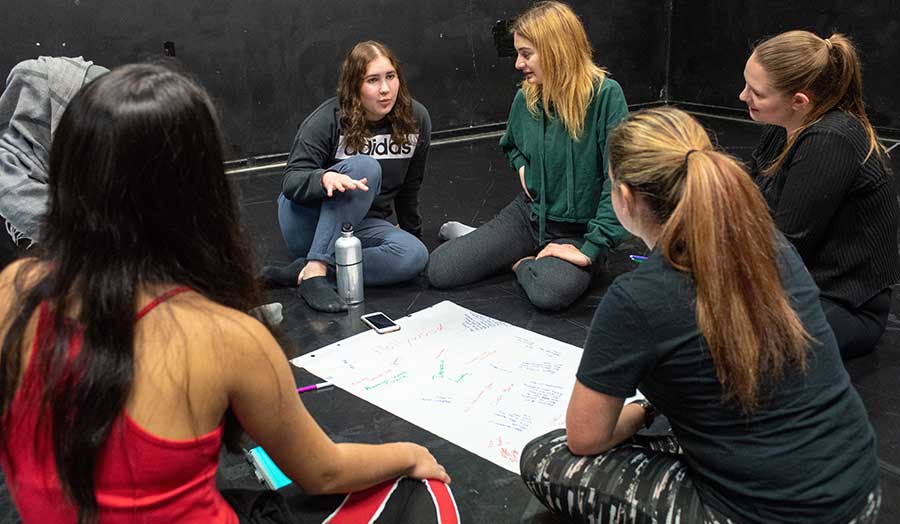
PGCE Secondary English with Drama - PGCE
This course will train you to teach English and Drama to 11 to 16-year-olds and, by arrangement, 16 to 18-year-olds.
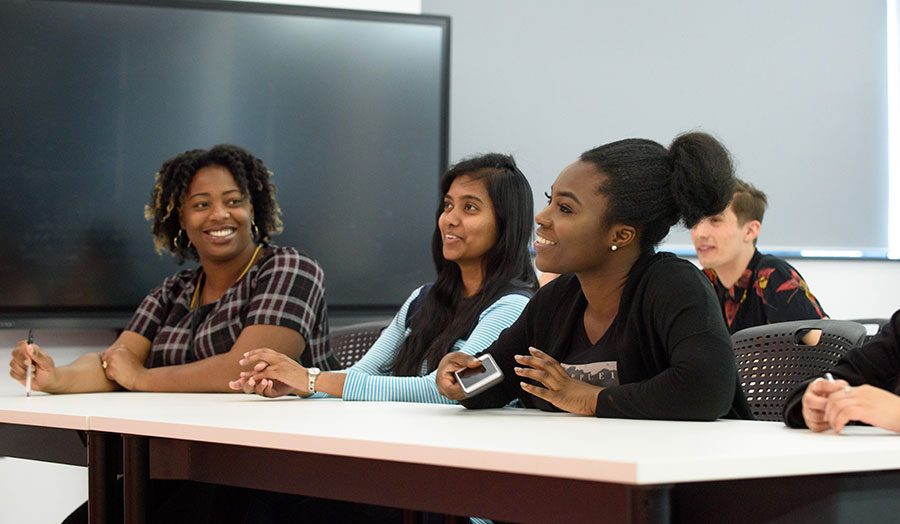
PGCE Secondary English with Media - PGCE
Train to teach English and media to 11 to 16-year-olds and, by arrangement, 16 to 18-year-olds.

PGCE Secondary Mathematics - PGCE
Train to teach maths to 11 to 16-year-olds and, by arrangement, 16 to 18-year-olds. This course leads to Qualified Teacher Status (QTS).

PGCE Secondary Modern Languages - PGCE
Train to teach modern languages to 11 to 16-year-olds and, by arrangement, 16 to 18-year-olds with our PGCE course that leads to Qualified Teacher Status (QTS).

PGCE Secondary Science with Biology - PGCE
Train to teach science and biology to 11 to 16-year-olds and, by arrangement, 16 to 18-year-olds on this PGCE course that leads to Qualified Teacher Status (QTS).
PGCE Secondary Science with Chemistry - PGCE
Train to teach science and chemistry to 11 to 16-year-olds and, by arrangement, 16 to 18-year-olds. This PGCE course leads to Qualified Teacher Status (QTS).

PGCE Secondary Science with Physics - PGCE
Train to teach science and physics to 11 to 16-year-olds and, by arrangement, 16 to 18-year-olds on our PGCE course that leads to Qualified Teacher Status (QTS).
-(1).jpg)
Primary (7-11) (Key Stage 2) - PGCE
Train to teach seven to 11-year-olds on our specialist Key Stage 2 course, with Qualified Teacher Status (QTS).
More articles like this...
Checking your eligibility to study a pgce, how to prepare for your teacher training application, how to write a good personal statement for pgce application, what to expect at your pgce interview.
Our cookies
We use cookies for three reasons: to give you the best experience on PGS, to make sure the PGS ads you see on other sites are relevant , and to measure website usage. Some of these cookies are necessary to help the site work properly and can’t be switched off. Cookies also support us to provide our services for free, and by click on “Accept” below, you are agreeing to our use of cookies .You can manage your preferences now or at any time.
Privacy overview
We use cookies, which are small text files placed on your computer, to allow the site to work for you, improve your user experience, to provide us with information about how our site is used, and to deliver personalised ads which help fund our work and deliver our service to you for free.
The information does not usually directly identify you, but it can give you a more personalised web experience.
You can accept all, or else manage cookies individually. However, blocking some types of cookies may affect your experience of the site and the services we are able to offer.
You can change your cookies preference at any time by visiting our Cookies Notice page. Please remember to clear your browsing data and cookies when you change your cookies preferences. This will remove all cookies previously placed on your browser.
For more detailed information about the cookies we use, or how to clear your browser cookies data see our Cookies Notice
Manage consent preferences
Strictly necessary cookies
These cookies are necessary for the website to function and cannot be switched off in our systems.
They are essential for you to browse the website and use its features.
You can set your browser to block or alert you about these cookies, but some parts of the site will not then work. We can’t identify you from these cookies.
Functional cookies
These help us personalise our sites for you by remembering your preferences and settings. They may be set by us or by third party providers, whose services we have added to our pages. If you do not allow these cookies, then these services may not function properly.
Performance cookies
These cookies allow us to count visits and see where our traffic comes from, so we can measure and improve the performance of our site. They help us to know which pages are popular and see how visitors move around the site. The cookies cannot directly identify any individual users.
If you do not allow these cookies we will not know when you have visited our site and will not be able to improve its performance for you.
Marketing cookies
These cookies may be set through our site by social media services or our advertising partners. Social media cookies enable you to share our content with your friends and networks. They can track your browser across other sites and build up a profile of your interests. If you do not allow these cookies you may not be able to see or use the content sharing tools.
Advertising cookies may be used to build a profile of your interests and show you relevant adverts on other sites. They do not store directly personal information, but work by uniquely identifying your browser and internet device. If you do not allow these cookies, you will still see ads, but they won’t be tailored to your interests.
How to write a PGCE personal statement
29 th September 2021

- Post on Facebook
- Send to a friend
- Recommend 0
Advice on how to write a PGCE personal statement that shows you’d make a great addition to a teacher training course.
What is a teacher training personal statement?
What to write, pgce personal statement tips.
When applying for a PGCE or postgraduate teacher training, you’ll probably have to write a personal statement. This is your chance to say why you’d make a great teacher by highlighting your relevant experiences and passion for teaching.
If you’re applying directly to a university or school, you should tailor your statement precisely to the course you’re applying for.
If you’re applying through UCAS Teacher Training, you can send your application to more than one university. Therefore, your statement should be more generic so that it applies to each one you’re applying to.
In both cases, make sure that your personal statement reflects the nature of the course or courses you’re applying for. Think about, for example, is it school- or university-based training? What age of students will you be teaching? Will you be specialising in a particular subject?
Before you start writing, look at any information you can find about the course and what you must do to apply. Has the university provided any guidance or topics of what you need to cover?
If not, can you speak to one of the course tutors to discuss what they might want to see in your statement? Or can you talk to a current PGCE student and ask what they wrote in theirs?
When you have a good idea of what admissions tutors will be looking for, create a mind map or list:
- Your relevant academic and practical experiences
- Areas of the course that you’re most interested in
- Anything else the university wants you to include
When structuring your statement, you can use your mind map or list to plan what information to put where.
Your structure can look something like:
- Introduction – about yourself and why you want to do the PGCE
- Middle paragraphs – relevant information of your academic achievements and experiences of working within education
- Concluding paragraph – tying up the main points of why you’re the best candidate for the course
If you’re applying directly to the university, check what the word limit for your personal statement is.
If you’re submitting to UCAS Teacher Training, your personal statement can be up to 47 lines of text or 4,000 characters.
Expanding on your mind map or list from before, think in more depth about why you want to teach.
- What qualities do you have that would make you good at teaching?
- What do you think are the challenges and benefits of being a teacher?
- Why have you chosen this particular age group and/or subject?
- What have you learned from your previous experiences in education?
- Will you be completing any extra exams or relevant experiences before the course starts?
If you studied education at undergraduate level, your course was probably focused on the theoretical side of the subject. Your PGCE course, however, will be about applying those theories to real-life situations in schools. Your personal statement should reflect your understanding of this.
If you haven’t taught before, what other activities or events in your life suggest that you would make a good teacher? Have you worked with children in different environments?
Admissions tutors don’t just want to see why you think your experiences make you a good teacher. Instead, they want to know that you’re aware of the importance of teaching and the demands that come with it.
- Why is it important to reflect on your abilities as a teaching practitioner?
- How will you work on your own development to become a great teacher?
- What interests you about the education system and its challenges?
- Do you have any thoughts are on child welfare and social justice?
When writing, make sure to use evidence and examples to back up your points. Through your tone of voice, try to show that you are positive and passionate about the work.
To see more information on how to style your personal statement, see our postgraduate statements guide.
- Ask someone you know to check it through. Even better if you can get feedback from a teacher
- See if you can speak to other students applying for a PGCE to share thoughts and ideas of what to write
- Similarly, reach out to PGCE staff at your university – or a teacher you know – they have experience that might be valuable to you!
- Any time you can spend in a school will be a valuable addition to your application. If you haven’t already, see if you can arrange to volunteer with one locally
- If you’re invited to an interview, you’ll be asked about what you’ve written on your statement, so be prepared to talk about it in more detail
DON'T MISS OUT
Receive regular newsletters packed with useful tips.
Converting a Postgraduate Certificate to a Masters
PG certificates are a perfect stepping stone to a Masters degree as you’ll not only...
Law and Legal Studies - Postgraduate Guide
As it is a subject that touches many other sectors, there are various postgraduate...
A Postgraduate Timeline
"Where on earth do I start?" That’s generally the first thought that runs through...
Similar articles and videos
Best universities for business studies, best universities for aeronautical and aerospace engineering, best universities for chemistry, best universities for sports science, don't miss out.
- How To Write Your Postgraduate Personal Statement
Postgraduate study
- Qualification types
- What are the differences between an undergraduate and postgraduate personal statement?
- Why study postgraduate?
What's on this page?
What is a personal statement, preparing to write your personal statement, opening your personal statement, work experience and future plans, ending your personal statement.
Your postgraduate personal statement is your chance to get noticed for your expertise and experience you’ve gathered. It’s an important part of the application process as it allows you to talk about yourself and your passions and prove the value you can bring to your chosen university.
In this article, we’re going to talk you through how to write a postgraduate personal statement that stands out and gives you the best chance of being offered a place on the master’s programme you’re applying for.
Shona Barrie – Director of Admissions, University of Stirling
You’ll have already written a personal statement for your undergraduate study, so you’ll know the importance of preparation. There are two things to think about when you’re planning:
- The practical and factual information you need to get across.
- Then, the more emotional, human parts of you that make you different to everyone else.
Before you start writing, take some time to think about the key things you’d want your chosen university to know about you, and get them down on paper.
Questions to focus your mind
- Why have you chosen this master’s programme?
- Why are you passionate about this subject matter?
- How has your undergraduate study influenced your decision to apply?
- Have you got any work experience that might help you?
- What life experiences have you had that you could talk about?
- What achievements can you talk about to support your application?
- Why do you want to study at this particular university?
- What plans and ambitions do you have for your future career?
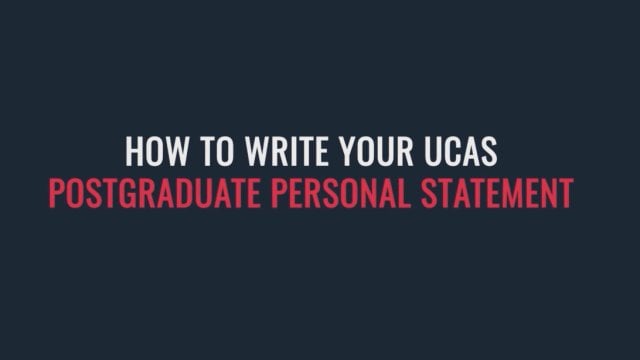
Three top tips
Be specific.
Remember that a postgraduate personal statement needs you to talk specifically about the university you’ve chosen.
Demonstrate experience
Universities will be looking for postgraduate students who are able to demonstrate expertise in a particular subject – so include that.
Show what you've learnt
Tell the university about your university life as an undergraduate and include any clubs or societies you were involved in.
Admissions tutors will be reading a lot of personal statements so it’s important to grab their attention right from the start.
You can find a full guide on How to start a personal statement: The attention grabber but here are the main things for you to think about.
- Don’t overthink the opening . Just start by showing your enthusiasm for the subject, showcasing your knowledge and understanding, and sharing your ambitions of what you want to achieve.
- Avoid cliches . Remember, this opening part is simply about introducing yourself, so let the admissions tutor reading your personal statement get to know you.
- Keep it relevant and simple . You’re limited on how much you can include so avoid long-winded explanations. Why use 50 words when ten can make your point?
Talking about the course
Now you’re ready to start talking about the course and subject you’re applying for.
There are four main areas you’ll need to cover in this section of your personal statement.
- Why are you applying for this master’s? Think about your undergraduate study and how this master’s will develop your expertise further. Do you have career aspirations this course will help you achieve?
- Why does the subject interest you? This is your chance to show your passion and really demonstrate who you are. If you have work or volunteering experiences related to the subject, include them here.
- Why do you think you’ll be an asset to the university? Your personal and practical skills combined together create a unique picture of who you are and why you’ll be a successful postgraduate student, so include both.
- How does your previous undergraduate study relate to the course? Showcase your enthusiasm for your current study and take the opportunity to demonstrate your skills and knowledge now, and how you want to build on that.
Next, you’ll need to write about your personal skills and achievements.
Universities like to know the abilities you have that’ll help you on the course, or generally with life at university. Don’t forget to include evidence to back up why you’re so passionate about the programme you’ve chosen.
Your personal skills and achievements
Be bold and talk about the achievements you’re proud of., include positions of responsibility you hold, or have held, both in and out of school., what are the things that make you interesting, special, or unique .
Your work experience and future plans are important to include in your personal statement. You should share details of jobs, placements, work experience, or voluntary work, particularly if it's relevant to your course.
- Try to link any experience to skills or qualities that’ll make you successful on your course.
- If you know what you’d like to do after as a career, explain how you plan to use the knowledge and experience you’ll gain.
It’s always good to connect the beginning of your statement to the end and a great way to reinforce what you said at the start. You want to see the ending as your chance to end in a way that’ll make the university remember you.
This final part of your personal statement should emphasise the great points you’ve already made and answer the question of why you should be offered a place on the course.
Read our full guide on How to finish your statement the right way .
Aakriti Labra – MSc Occupational and Organisational Psychology, University of Surrey
Now you’ve written your postgraduate personal statement, you’ll need to do a couple of final things before you submit it.
- Have you proofread your personal statement? Don’t just rely on spellcheckers. We’d recommend reading it out loud as that’s a great way to spot any errors as well as checking it sounds like you.
- Have you asked for feedback? Ask friends, family or your undergraduate university tutors to have a read through your personal statement and take their feedback on board.
- Check out our personal statement dos and don'ts Have a look at the common pitfalls against your final draft to make sure you haven't made any obvious errors!
Postgraduate
More advice.
Use the UCAS’ personal statement tool alongside this guide to help you structure your ideas.
Do you want to understand the differences between an undergraduate and postgraduate personal statement? Take a look at our guide here.
Why study a postgraduate course? Find out here.
What funding is there for postgraduate courses?
Sponsored articles UCAS Media Service
Student finance for postgraduate loans, how to find a job, five reasons to sign up to the ucas newsletter.
Register now for
Please leave this field empty.
How did you hear about us?* Website Social Media Search Engine Recommended
Please answer: What is 1 + 3?
First Name*
Email Address* Please leave this field empty.
Telephone No
Your Enquiry*
Please answer 2 + 1 = *
Writing a personal statement for a PGCE

How To Write a PGCE Personal Statement
Your personal statement is crucial to the success of your application and must be well written, concise, well-structured. It must also clearly demonstrate your reasons for choosing teaching and your commitment and suitability for this career in only 47 lines!
Before applying, do your research. Find out what being a teacher is really like. Get experience in a school, talk to teachers and read careers information.
General Tips:
- Compose your statement in Word and cut and paste it into your online application. This will allow you to ensure it fits, that you have used spell check and have proofread it to ensure its word perfect. Personal statements with a poor level of written English will be rejected.
- Use Verdana 12 as this is the size and font used by UCAS.
- Ensure it has a good structure with an introduction, a middle and a conclusion.
- Get someone to check your final draft who is knowledgeable in this area and whose judgement you trust.
- Research the Training Provider you are applying for. Which skills/experience/qualifications do they expect?
Your Personal Statement should:
- be persuasive
- be fluent, realistic, relevant and specific
- mention young people- it is about enabling them to learn rather than why you want to teach
- overuse of short sentences all beginning with ‘I’
- general statements and narrative
- I feel/think/believe – instead, use positive action words e.g. planned/managed/implemented/organised
- making a statement without having evidence to back it up
Sections in your Personal Statement:
- Introduction- why teaching and why you?
- The relevance of your work experience
- What subject you want to teach and why?
- Additional factors
- Concluding paragraph
1.Introduction
Why teaching?
- What is your motivation? What has influenced your decision to teach? Avoid ‘I have always wanted to teach’ or ‘I believe teaching is worthwhile’ or ‘I like children’.
- Concentrate on what influenced your decision to teach, how the idea has developed and what can you offer in terms of personal skills and attributes.
- Have certain people influenced you? Why? How?
- Show your desire to work with young people and refer to evidence.
Make a list of skills and qualities that you have that can be linked to all the key skills that make an effective teacher and how you can demonstrate this with examples:
- Organisation
- Communication
- Energy & enthusiasm
- Responsibility
- Love of subject
- Team player
2.Relevant Experience
School-based experience:
- Where? Try to avoid visiting the school you attended as a pupil
- How long for? One day is probably not enough time to see what it means to be a teacher, you need enough time to gain a good understanding of teaching and schools.
- What did you do? Did you observe lessons, work as a TA, attend meetings/training/ research curriculum/teaching and learning/had a focus on EAL or SEND pupils?
- What Key Stages did you experience? Make sure it is relevant to the specific PGCE course you are applying for.
- What techniques did you observe? Effective and not effective and why?
- Lesson-planning
- Classroom organisation
- Classroom management
- Inclusion/ diversity issues e.g. English as an additional language (EAL); special educational needs (SEND); disadvantaged pupils and gifted and talented pupils.
Always say what you have done and how it demonstrates the skills required as a teacher. For example, ‘reading with a group of pupils showed me that…’ or ‘working with a low ability group allowed me to…’
Other work with young people (paid/unpaid):
- Youth groups
- After school groups
- Summer camps
What if you don’t have any relevant experience?
Highlight the other experiences you have engaged in and use these to demonstrate your understanding of teaching and schools.
3. What subject you want to teach and why?
- For Secondary, you need to show that you are passionate about your subject area and passing on that enthusiasm to young people.
- Link to relevant work experience, what have you observed and match your skills to this.
- Refer to any research you have done regarding your subject and also the curriculum/ examinations you would be required to teach at that Key Stage
- Link your qualifications and wider reading to your subject knowledge, if your qualifications are not relevant you need to show how you are going to develop your subject knowledge in order to teach the subject.
- State why you have applied to this particular type of PGCE course e.g. school-based/ flexibility/ reputation.
4. Additional Factors
- Hobbies linked to the profession/ skill set e.g. value-added skills such as sport, music, language etc.
- Additional courses you have completed/ completing e.g. ICT, subject knowledge enhancement course etc.
- Further experiences planned for the future prior to commencing a PGCE course.
5. Concluding Paragraph
- State your commitment to the course, acknowledge that teaching requires dedication, stamina, time management, being pro-active
- Reinforce your reasons for being committed to teaching
- Demonstrate awareness of the physical and mental demands of the course and the profession
- Career plan – what is your goal for your teaching career?
A teacher’s must-have qualities:
- Interpersonal skills
- Ability to think of their feet
- Good time-management
Background Reading
www.ucas.com/ucas/teacher-training
Times Educational Supplement ( www.tes.com )
www.theguardian.com/education
Ready to apply for a course with us? Visit our How to Apply section for what to do next
Find out about training with Leeds SCITT - take a look at our upcoming events and reserve your place today
We use cookies on this website, by continuing to browse the site you are agreeing to our use of cookies. Find out more .

PGCE Personal Statement Examples
- 1 Personal Statement Example Links
- 2 Career Opportunities
- 3 UK Admission Requirements
- 4 UK Earnings Potential For PGCEs
- 5 Similar Courses in UK
- 6 UK Curriculum
- 7 Alumni Network
Personal Statement Example Links
- Personal Statement Example 1
- Personal Statement Example 2
- Personal Statement Example 3
- Personal Statement Example 4
Ever been inspired by the idea of shaping young minds and making a lasting impact on learners’ lives? Intrigued by the prospect of transitioning into the rewarding world of teaching?
If so, embarking on a PGCE – Postgraduate Certificate in Education , could be your ideal journey. This critical educational qualification equips you with the skills and knowledge to transform your passion into a teaching profession.
A PGCE (Postgraduate Certificate in Education) is a postgraduate qualification that allows you to teach in the UK. It is a highly sought after qualification and is essential for anyone wishing to pursue a career in teaching.
The PGCE course is an interesting and relevant choice for students as it offers them the chance to learn from experienced professionals and gain valuable insight into the teaching profession. It also provides an opportunity to develop their own teaching style and gain an understanding of the educational system. The course is also highly relevant for those looking to pursue a career in teaching, as it provides them with the necessary qualifications and skills to be successful in the profession.
👍 When writing a personal statement : Highlight your passion for the course, demonstrating your understanding of it. Use relevant personal experiences, coursework, or work history to showcase how these have fostered your interest and readiness for the course.
Career Opportunities
A PGCE (Postgraduate Certificate in Education) is a qualification that enables someone to become a qualified teacher in the UK. With this qualification, graduates can pursue a career in teaching in both state and private schools, as well as in further education colleges.
In addition to teaching, a PGCE can open up a range of other career opportunities. Graduates can pursue roles in the education sector, such as educational psychologists, school counsellors, learning support assistants, special educational needs coordinators, and school governors. They can also pursue roles in the wider public sector, such as policy makers, educational consultants, and lecturers in universities.
Those with a PGCE can also pursue careers in the private sector. They can become educational consultants, working with businesses and organisations to develop training programmes and learning materials. They can also work in the publishing industry, developing educational materials for schools and universities.
Finally, PGCE graduates can also pursue roles in the charity sector. They can work in charities that focus on education, such as those that provide educational opportunities for disadvantaged children, or those that promote educational research. They can also work in charities that focus on other areas, such as health or the environment, using their skills and knowledge to develop educational materials and programmes.
UK Admission Requirements
The entry requirements for the PGCE course vary depending on the institution, but typically require a minimum of a 2:1 degree in a related subject, or a 2:2 degree with additional experience or qualifications.
In addition to the degree requirements, applicants must also have a minimum of 5 GCSEs at grade C or above, including English, Maths and Science.
Applicants must also have a satisfactory enhanced Disclosure and Barring Service (DBS) check.
The entry criteria for the PGCE course is similar to other courses in the same field, such as the Postgraduate Certificate in Education (PGCE). However, the PGCE course does require a higher degree classification than the PGCE.
In addition, the PGCE course requires applicants to have a minimum of 5 GCSEs at grade C or above, whereas the PGCE does not have this requirement.
Finally, the PGCE course requires applicants to have a satisfactory enhanced Disclosure and Barring Service (DBS) check, whereas the PGCE does not have this requirement.
UK Earnings Potential For PGCEs
The average earnings for someone with a PGCE will depend on the type of job they are able to secure. Generally, those with a PGCE can expect to earn between £25,000 and £45,000 per year, depending on their experience and the job they are able to secure.
The job market for those with a PGCE is very competitive, and there is a growing demand for teachers with a PGCE in the UK. Salaries for teachers with a PGCE have been rising over the past few years, and this trend is expected to continue. Additionally, those with a PGCE may be able to find higher paying jobs in the private sector, such as teaching in private schools or working as a private tutor.
Similar Courses in UK
Other university courses related to the PGCE course are the following Postgraduate Certificate in Education (PGCE) Secondary, the Postgraduate Certificate in Education (PGCE) Primary, the Postgraduate Certificate in Education (PGCE) Further Education and Training, and the Postgraduate Certificate in Education (PGCE) Special Educational Needs and Inclusion.
The key differences between these courses are the age range of the students they are designed to teach. The PGCE Secondary is designed to teach students aged 11-18, the PGCE Primary is designed to teach students aged 4-11, the PGCE Further Education and Training is designed to teach post-16 students, and the PGCE Special Educational Needs and Inclusion is designed to teach students with special educational needs and disabilities.
Additionally, the PGCE courses all have different entry requirements, such as a degree in a relevant subject, teaching experience, and a satisfactory Disclosure and Barring Service (DBS) check.
UK Curriculum
The PGCE course covers a range of topics and modules related to teaching and learning. These include:
- Professionalism and Professional Learning: This module focuses on the development of professional values and attitudes, as well as the development of professional learning. It also covers the development of professional relationships with colleagues, students and parents.
- Curriculum and Pedagogy: This module focuses on the development of curriculum knowledge and understanding, as well as the development of pedagogical approaches to teaching and learning. It also covers the development of curriculum planning and assessment.
- Educational Technology: This module focuses on the use of technology in teaching and learning, as well as the development of digital literacy skills. It also covers the use of digital tools in teaching and learning.
- Special Educational Needs: This module focuses on the development of an understanding of special educational needs and the development of strategies to support learners with special educational needs.
- Inclusion and Diversity: This module focuses on the development of an understanding of inclusion and diversity in education, as well as the development of strategies to support learners from diverse backgrounds.
- Assessment and Evaluation: This module focuses on the development of an understanding of assessment and evaluation in education, as well as the development of strategies to support learners in assessment and evaluation.
The PGCE course also includes hands-on experience and practical work. This includes classroom observation, teaching practice, and the development of teaching resources.

Alumni Network
Notable alumni from the PGCE course include Professor Simon Peyton Jones , a computer scientist and researcher at Microsoft Research in Cambridge, UK. He is a Fellow of the Royal Society, a Fellow of the British Computer Society, and a Fellow of the Association for Computing Machinery.
Professor Peyton Jones is well known for his work on the Haskell programming language and for his contributions to the development of functional programming. He has also written several books on the subject of functional programming, including “Programming in Haskell” and “The Implementation of Functional Programming Languages”.
The University of Cambridge offers a number of alumni events and networking opportunities for PGCE graduates. These include the Cambridge Alumni Network, which is an online platform for alumni to connect with each other, share ideas and resources, and stay up to date with the latest news from the university.
Additionally, the university hosts a number of alumni events throughout the year, such as the Cambridge Alumni Festival, which is an annual event held in the summer. This event includes lectures, panel discussions, and networking opportunities with alumni and faculty members.
Reach out to us for career and sponsorship opportunities
© 2024 Acrosophy Excellence in Application
A Medical MBA Company The Medical MBA Ltd Company number: 13561401 86-90 Paul Street, London, England, United Kingdom, EC2A 4NE
Writing a Postgraduate Teacher Education personal statement
Updated on 7 July 2023
Guidance on how to write a PGDE/CE personal statement and an example to help demonstrate your skills, experience and motivation for teaching.
A personal statement is a short piece of writing (47 lines/4000 characters) which you are asked to submit in support of your application to study a PGDE/CE made through UCAS. It is your opportunity to demonstrate your skills, experience and motivation for teaching.
Before you start
Remember that this is a very important part of your application. Take your time to carefully plan out and practise your statement. It is a good idea to draft your statement in a word document and get some feedback on it before committing to the final version..
- Don't waste space with irrelevant or repetitive information. Be succinct and avoid complicated language and overly long sentences.
- Be specific about what you have to offer. Detail what you have gained from your experiences in schools/working with children. Give appropriate evidence of the skills you possess for teaching.
- Indicate the relevance of other types of experience or skills you possess, e.g. supervising people or sports
- Avoid using negative language. Present any gaps in skills or experience positively.
- Finish with a summary of what you have to offer leave the selectors with a clear understanding of your suitability for the course.
- Let your enthusiasm for teaching and working with children shine through in everything you say.
- Check grammar and spelling thoroughly! Do not rely on the spelling and grammar check on your word processing package alone. Ask someone to proof read it for you.
- If you are cutting and pasting from a word document, remember to check the formatting.
Questions to consider when structuring your Personal Statement
- Why do you want to be a teacher? - What has inspired you; who/what influenced you?
- Why do you want to work with young people? - What appeals to you about working with this age group; what skills do you possess that will help you?
- Why do you want to teach your subject? For primary: demonstrate a breadth of knowledge across a range of curriculum areas. For secondary, show how your subject knowledge is relevant to the curriculum.
- What have you gained from working with young people? - Have you had any experience in schools or working with children in other settings? Reflect upon what you did, what you observed, what you learned.
- What else can you offer? Skills in sports, music, languages, arts and crafts, ICT etc.
This is an example personal statement. There is considerable room for improvement and the notes make suggestions to help you with writing yours.
I am applying for the PGDE course because I have always wanted to be a teacher. I really like working with children and think that I have the right kinds of skills to become a good teacher .
- The above statement is far too short: you are allowed 47 lines/4000 characters so use them.
- Remember to specify whether you are applying f or primary or secondary courses.
- It is not enough to say that you have developed the "right kinds of skills". Be specific about them.
- It is important to have a strong opening statement . It is the first thing the selectors will read so you want to make an impact.
- Think about why you have always wanted to teach and clearly demonstrate.
New Paragraph
At school, I was involved with the Primary 1 class when I was in final year. I helped the less able children with reading on a one to one basis. I also help out at my local Brownie pack every week, keeping the girls busy with various activities. I have applied to do the Student Tutoring Scheme.
- When describing experience with children, make sure you are specific about what you learned from the work and the skills you developed.
- You need to demonstrate (by providing evidence) that you have developed/ have the potential to develop skills such as communication, leadership, teamwork, problem solving, organisation, planning and time management.
At school I studied a wide range of subjects but the one I enjoyed most was History so that is what I have studied at university. I also took Psychology and Politics in first year and Politics in second year too.
- When describing your studies, remember to show how this is relevant to the subject(s) you will be teaching.
I have been a babysitter for two children for several years and enjoy helping the older child with his homework now that he is at school.
- When describing your experience remember to demonstrate the transferable skills you have gained in this role that would be relevant to teaching. For example with babysitting you could link to the skill of 'behaviour management'.
I am very interested in education generally and keep up to date with current issues by reading the BBC website.
It is not enough to say that you 'keep up-to-date' here. Give a summary of what you have to offer and stating why you should be offered a place on the course.
Careers service
Student Good Guide
The best UK online resource for students
Primary Teacher PGCE Personal Statement
If you are applying to PGCE Primary, you will need to prepare a good personal statement. Learn how to prepare your application for PGCE from our Primary PGCE Personal Statement example .
Primary Teacher Personal Statement Example
One day, I hope to become a primary teacher. Primary and secondary education have both been highly positive experiences for me. It is my desire to inspire and encourage children of all abilities to achieve their full potential that drives me to apply for primary education.
I gained valuable experience working in a primary school setting from the perspective of a teacher. The uniqueness of each child and the way each day is different is what I enjoyed most about my job. I am also applying for a History degree since this would allow me to study a P.G.C.E. after I complete my undergraduate studies. I have always enjoyed Art, particularly the early modern era up until the 20th century, a period I find fascinating. Researching the history of my family and the local area is my favourite aspect of Art history. I have arranged a work experience placement at a local primary school on Monday morning during my free periods. I have gained a great deal of insight into the challenges and situations primary school teachers face. As a teacher, I have been able to provide extra support to students who are underachieving in literacy and numeracy. I have improved my interpersonal skills immensely as I have had to communicate with children of different abilities, cultures and religions from Primary 1 to Primary 7. In addition to being challenging, it is also extremely enjoyable. I am most enjoying helping with small group work and projects with Primary 3 to 7 classes, assisting the pupils in History and English lessons, and using ICT as an educational and motivational tool. When I see pupils who struggled in these areas improve, it is very rewarding for me.
I have also participated in the school’s Community Care program, where I visited a residential care home once a week and spoke with the residents. Their personal perspectives on childhood experiences and the past were enjoyable to hear. By performing songs on guitar, accordion, and voice for residents, and reading novels and poems to them, I have become more approachable, confident, and trustworthy. I have served as Chairperson of the Eco-School’s Committee for four years in school.
Further, I have enjoyed attending debates and lectures from renowned historians such as Senia Paseta, Richard Grayson, and Philip Orr as a member of the Omagh Academy History Society. In my free time, I’m a member of the Bridge Club of Leeds.
My Queen’s Badge is something I’m aiming toward having recently earned my President’s Award. I assist in the Boy area, which serves boys between the ages of 4 and 7, in order to obtain more experience working with kids. It is my obligation to organize and present drills, games, and Bible tales. I also like to play a variety of musical instruments, such as the lambing drum, accordion, guitar, and flute. I am actively involved in the Omagh Community Youth Choir and am pursuing my Grade 5 on the guitar. I have performed with the choir as a support act for the Red Hot Chilli Pipers at the SSE Arena in Belfast.
I learned how crucial it is for primary school teachers to be able to play an instrument at school concerts and events through my work placement. I have joined the Fintona Taekwondo Club with enthusiasm. It has helped me become more tenacious, determined, polite, and disciplined. Taekwondo has helped me stay physically active, and I intend to continue practising it when I’m in college since I find it to be a wonderful stress reliever. I think I’m a good fit for this profession because I want to be a teacher in the long run. My decision to apply for primary courses has been solidified by my great experiences with work placement and volunteer work with the Boys’ Brigade’s Anchor Boys section.
Recommended reading:
- Personal Statement Examples
- How to Write a Personal Statement for a PhD
- UCAS Personal Statement: A Writing Guide And Tips For Success
- How to Write a Personal Statement That Stands Out
- Tips for Writing a Personal Statement for the University
- How to Write UCAS Reference Letter
Other personal statement examples:
- Animal Science Personal Statement Examples
- Anthropology personal statement examples
- Statistics Personal Statements
- PPE Oxford Personal Statement Example
- Classics Personal Statement Examples
- Theology Personal Statement Examples
- Physics Personal Statement Examples
- Chemical Engineering personal statement examples
- Oncology Personal Statement Examples
- Psychiatry Personal Statement Examples

- Careers Service
- Which career
- Jobs / experience
- Applications / interviews
- International
- CareerConnect
- Applications for further study
- Personal statement for teaching
- UCAS personal statement for medicine
Writing a personal statement for teacher training
These guidelines apply to applications for a PGCE or Schools Direct which are both made through Apply on the .Gov website
Include the following:
- Your reasons for teaching: Avoid clichés like, "I've always wanted to be a teacher".
- Choice of programme: Demonstrate that you have made a well-researched and informed choice. Show your knowledge of Initial Teacher Training providers.
- Knowledge and commitment to the age range you are applying for: If you are applying for both primary and secondary places in the same application, you need to make a strong case for your preferred option.
- Subject specific commitment: Subject tutors read the forms, so if you are applying for secondary it is important to mention this.
- Enthusiasm: Selectors look for clear-headed, informed enthusiasm. You need to demonstrate you understand the demands of the profession. Why would you be a good teacher?
- the national curriculum, national strategies and subject organisations eg The Association of Science Education
- classroom management (behaviour, groups, resources, timing and pastoral care)
- teachers roles and responsibilities
- classroom organisation
- differentiation- special education needs (SEN)
- the role of ICT
- assessment for learning
- awareness of possible gaps - eg if you have a C grade in English and are applying for primary, you need to show that you are willing to polish up
- Mention any geographical restrictions you have, as these may be taken into account.
- Get advice on your personal statement
- Information on routes into teaching
Further advice
- From the Department for Education
- Target Jobs advice on writing your personal statement
- Getting in touch
Careers Service, The University of Manchester
Connect with us
- Copyright notice
- Accessibility
- Freedom of information
- Charitable status
- Royal charter number: RC000797
- Applying to Uni
- Apprenticeships
- Health & Relationships
- Money & Finance
- Personal Statements
- Postgraduate
- U.S Universities
- University Interviews
- Vocational Qualifications
- Accommodation
- Budgeting, Money & Finance
- Health & Relationships
- Jobs & Careers
- Socialising
- Studying Abroad
- Studying & Revision
- Technology
- University & College Admissions
Guide to GCSE Results Day
Finding a job after school or college
Retaking GCSEs
In this section
Choosing GCSE Subjects
Post-GCSE Options
GCSE Work Experience
GCSE Revision Tips
Why take an Apprenticeship?
Applying for an Apprenticeship
Apprenticeships Interviews
Apprenticeship Wage
Engineering Apprenticeships
What is an Apprenticeship?
Choosing an Apprenticeship
Real Life Apprentices
Degree Apprenticeships
Higher Apprenticeships
A Level Results Day 2024
AS Levels 2024
Clearing Guide 2024
Applying to University
SQA Results Day Guide 2024
BTEC Results Day Guide
Vocational Qualifications Guide
Sixth Form or College
International Baccalaureate
Post 18 options
Finding a Job
Should I take a Gap Year?
Travel Planning
Volunteering
Gap Year Blogs
- Top Rated Personal Statements
Personal Statement Examples
Writing Your Personal Statement
- Postgraduate Personal Statements
- International Student Personal Statements
- Gap Year Personal Statements
Personal Statement Length Checker
Personal Statement Examples By University
Personal Statement Editing and Review Service
- Personal Statement Changes 2025
- Personal Statement Template
Job Interviews
Types of Postgraduate Course
Writing a Postgraduate Personal Statement
Postgraduate Funding
Postgraduate Study
Internships
Choosing A College
Ivy League Universities
Common App Essay Examples
Universal College Application Guide
How To Write A College Admissions Essay
College Rankings
Admissions Tests
Fees & Funding
Scholarships
Budgeting For College
Online Degree
Platinum Express Editing and Review Service
Gold Editing and Review Service
Silver Express Editing and Review Service
UCAS Personal Statement Editing and Review Service
Oxbridge Personal Statement Editing and Review Service
Postgraduate Personal Statement Editing and Review Service
You are here
- Mature Student Personal Statements
- Personal Statements By University
- Accountancy and Finance Personal Statements
- Actuarial Science Personal Statements
- American Studies Personal Statements
- Anthropology Personal Statements
- Archaeology Personal Statements
- Architecture Personal Statements
- Art and Design Personal Statements
- Biochemistry Personal Statements
- Bioengineering Personal Statements
- Biology Personal Statements
- Biomedical Science Personal Statements
- Biotechnology Personal Statements
- Business Management Personal Statement Examples
- Business Personal Statements
- Catering and Food Personal Statements
- Chemistry Personal Statements
- Classics Personal Statements
- Computer Science Personal Statements
- Computing and IT Personal Statements
- Criminology Personal Statements
- Dance Personal Statements
- Dentistry Personal Statements
- Design Personal Statements
- Dietetics Personal Statements
- Drama Personal Statements
- Economics Personal Statement Examples
- Education Personal Statements
- Engineering Personal Statement Examples
- English Personal Statements
- Environment Personal Statements
- Environmental Science Personal Statements
- Event Management Personal Statements
- Fashion Personal Statements
- Film Personal Statements
- Finance Personal Statements
- Forensic Science Personal Statements
- Geography Personal Statements
- Geology Personal Statements
- Health Sciences Personal Statements
- History Personal Statements
- History of Art Personal Statements
- Hotel Management Personal Statements
- International Relations Personal Statements
- International Studies Personal Statements
- Islamic Studies Personal Statements
- Japanese Studies Personal Statements
- Journalism Personal Statements
- Land Economy Personal Statements
- Languages Personal Statements
- Law Personal Statement Examples
- Linguistics Personal Statements
- Management Personal Statements
- Marketing Personal Statements
- Mathematics Personal Statements
- Media Personal Statements
- Medicine Personal Statement Examples
- Midwifery Personal Statements
- Music Personal Statements
- Music Technology Personal Statements
- Natural Sciences Personal Statements
- Neuroscience Personal Statements
- Nursing Personal Statements
- Occupational Therapy Personal Statements
- Osteopathy Personal Statements
- Oxbridge Personal Statements
- Pharmacy Personal Statements
- Philosophy Personal Statements
- Photography Personal Statements
- Physics Personal Statements
- Physiology Personal Statements
- Physiotherapy Personal Statements
- Politics Personal Statements
- Psychology Personal Statement Examples
- Radiography Personal Statements
- Religious Studies Personal Statements
- Social Work Personal Statements
- Sociology Personal Statements
- Sports & Leisure Personal Statements
- Sports Science Personal Statements
- Surveying Personal Statements
- Teacher Training Personal Statements
- Theology Personal Statements
- Travel and Tourism Personal Statements
- Urban Planning Personal Statements
- Veterinary Science Personal Statements
- Zoology Personal Statements
- Personal Statement Editing Service
- Personal Statement Writing Guide
- Submit Your Personal Statement
- Personal Statement Questions 2025
Teacher Training Personal Statement Examples
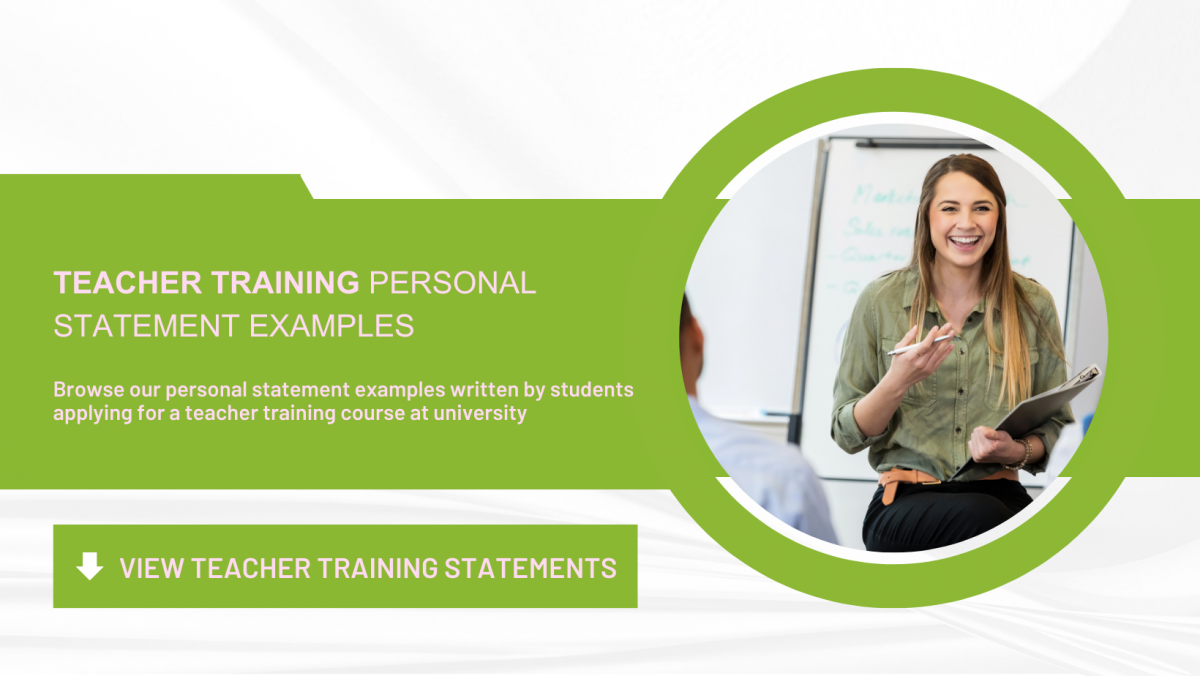
What is a teacher training personal statement?
The teacher training personal statement is your opportunity to let training providers know about your qualities, skills and expertise, and why you want to teach.
While your application form briefly outlines your qualifications, skills and work experience, your teaching personal statement is where your personality shines through.
Take your time with it, be prepared to receive constructive feedback and write a few drafts before you send it off.
How do I write a good teacher training personal statement?
To help you write a successful teacher training personal statement, we recommend you include:
- use examples to back everything up, based on your teaching experience so far
- tailor your personal statement according to the age group you wish to teach
- write using concise English, using first person terms such as 'my' and 'I'
- be original and honest - don't embellish the truth or lie outright
- avoid clichés and general statements, such as 'since a young age' or 'I've always wanted to be a teacher'
- demonstrate your passion and enthusiasm for teaching.
You have up to 4,000 characters to write a memorable opening, middle and conclusion.
Don't waste your valuable space on writing about things that are already on your UCAS form elsewhere, such as your qualifications.
What should I include in my teacher training personal statement?
When planning out your personal statement, ask yourself what it is your training providers are looking for. Make sure your statement answers the following questions:
- Why do I want to teach? - show that you know about the challenges and rewards of teaching, and remember that everything has its ups and downs. Maybe talk about any lessons you have observed/taught, what went well and how you would have improved on them. Discuss teaching styles used and the use of technology in the classroom.
- Why do I want to teach this age group/at this level? - what appeals to you, and what experience do you have teaching these students/children?
- What are my strengths? - include the relevance of your degree and subject knowledge.
- What experience do I have? - include any experience you have of volunteering with children, such as teaching a sports team, youth work or working at a summer camp? Give examples of how this helpd develop your teaching skills.
- What personal skills/abilities do I have? - these might include research, creativity, time management, IT skills, problem solving, managing people, organisational skills, listening skills, leading or working in a team. To strengthen your application, make sure you back everything up with examples.
- Are there are any location restrictions? - if you don't currently live in the UK, why do you want to study here? Are you willing to move away from your current home town/city for your degree?
You only have up to 47 lines (4,000 characters including spaces) in which to persuade your chosen initial teacher training (ITT) providers to offer you an interview. The statement must be concise, enthusiastic and sell your potential to be a successful teacher.
For more help and advice on what to write in your teacher training personal statement, please see:
- Personal Statement Editing Services
- Personal Statement Tips From A Teacher
- Analysis Of A Personal Statement
- The 15th January UCAS Deadline: 4 Ways To Avoid Missing It
- Personal Statement FAQs
- Personal Statement Timeline
- 10 Top Personal Statement Writing Tips
- What To Do If You Miss The 15th January UCAS Deadline.
What is a teacher training degree?
Teacher training degrees combine the study of curriculum subjects with learning teaching techniques and putting these into practice during hands-on school placements. The course leads to QTS (qualified teacher status) to enable you to teach in a school or college.
How long is a teacher training course?
To teach in England and Wales you need to gain QTS. You will obtain this on an ITT programme, which could be school or university-based and takes approximately one year to complete.
How do I become a teacher with a degree?
To teach as a qualified teacher in England, you'll need qualified teacher status (QTS). If you already have a degree, you can complete a postgraduate teacher training course to achieve this. Additionally, you'll need to have a GCSE at grade C/4 in maths and English, as well as science if you want to teach primary.
Can I train to be a teacher without a degree?
Unfortunately no - you cannot become a teacher without a degree.
But if you are an undergraduate or have a degree in a different subject than what you want to teach, there are options to help you get into a teaching career.
Will I get paid for teacher training?
There are three types of funding available for teacher training - depending on your circumstances, you could receive all three:
- Tax-free bursary or scholarship.
- Tuition Fee Loan and Maintenance Loan.
- Extra financial support if you're a parent, have an adult dependant or a disability.
Further information
For more tips and advice on teacher training personal statements, please see:
- GetIntoTeaching
- The Complete University Guide
Related resources
Teacher training interview questions.

Find out more
Applying For Teacher Training Courses

6 Personal Statement Writing Tips

How To Apply To University

UCAS Adjustment: How Does It Work?

A Level Results Day

Clearing Guide

Education Blog Ideas For Students, Tutors, Teachers
Personal statement for application to pgce in teaching.

PGCE stands for Postgraduate Certificate in Education, and it is among the most popular teaching courses. The objective of this course is to train and enhance the teaching capabilities of the students. Currently, this course is offered in England, Wales, and Northern Island.
Why Enrol in a PGCE Course? Although a Qualified Teacher Status (QTS) training course suffices to score a teaching job in England, a PGCE will enable you to expand your knowledge on a larger spectrum. Furthermore, the PGCE teaching course will enable you to adopt the flexibility to teach globally.
What are the Different Types of PGCE? There are three different types of PGCE that are discussed below:
1. Primary: This prepares an individual to teach the children up to the age group of eleven. This is the most popular class since the demand for such teachers is high. This course focuses on the curriculum syllabus; however, you may specialize in certain courses.
2. Secondary: This branch of PGCE focuses on particular subjects’ specialization and allows an individual to teach the students aged eleven to sixteen.
3. Advanced/Adult Education: If you want to teach at a college level, then this type of PGCE is for you. Simply, enroll yourself in this course and get a chance to conduct classes at a higher level.
It is to be noted that all the mentioned types require the enroled aspirants to serve for a minimum period of four weeks in schools or allocated key stages.
What Type of PGCE is Suitable for You? Only you can answer this question; however, other people can only assist you in reaching a conclusion. The following sources can help you find your calling:
Attend Open Days And Fairs: You can visit numerous universities on their open days and meet the representatives. Inquire them about the prospects of the PGCE course at the particular institute. To make the most of this option, educate yourself about the open days and events of different universities.
Talk To Current Students: In order to learn about the course content and workload, the current students can present a clear picture for you to ponder over the available options.
Consult a Career’s Service: The advisers can help you with your options and assist you in narrowing down the course choice for you. Furthermore, they can assist you with your application formulation.
Take Feedback from the Alumni: You can ask the alumni about the journey they had at a particular institution. Inquire them about their experience and ask them to educate you about the advantages or disadvantages associated with the PGCE course offered by the said institution.
What Should You Ask From Concerned Personnel? When meeting the relevant personnel, you should ask the following questions so as to shortlist your option:
- What is the cost of the course?
- Do you get any school experience? How much is it?
- Are there grants or student loans available?
- Is the employment record after completing a PGCE course positive?
- What are the institution’s credibility and does the department possess a good reputation?
- How many lectures and tutorials are required to be taken weekly?
How to Apply for the PGCE? In order to apply for the PGCE course, you are required to fill in an application form. To adequately perform the said task you should:
- Read about the details that should be included in the application.
- Go through authentic personal statement examples to devise a plan to fabricate your statement.
- Think about the references that should be included in your application.
What is a Personal Statement? Apart from the personal statement, the elements mentioned above are well-known. A personal statement is a document bearing explanation why you want to become a teacher and what makes you the best fit for the job. As the application briefly provides a snapshot of your qualifications, work exposure, and skills, the personal teaching statement is what brings your personality into the limelight.
It is vital that you invest ample time to formulate your personal statement and craft multiple drafts before shipping the final document. Ensure that your document touches the below-mentioned dimensions:
- Infuse glimpses from your past teaching experiences.
- Fabricate the personal statement as per the school or age group you are applying for.
- Make use of crisp English, and your sentences should be formulated in a coherent tone to deliver the message across the board.
- Be yourself and don’t try to present yourself as something you are not.
- Don’t be cliché to include statements like “I always wanted to be a teacher.”
- Reflect your passion via your personal statement writing.
How to Write Personal Statement for the Different Types of PGCE? Although all the elements mentioned above are to be included in the personal statement, there are certain specifications to be infused in different types of PGCEs:
Requirements of Personal statement for Primary PGCE: In this type of PGCE personal statement document, you should describe your adaptability trait and demonstrate the set of skills which can be useful for the primary schools’ extracurricular activities. For instance, you can include your expertise in conducting stage dramas which can help the particular school with their plays.
Requirements of Personal statement for Secondary PGCE: A good PGCE secondary personal statement is considered to be the one which discusses the set of challenges involved in teaching the teenager age group and further presents glimpses of the past experience, where the candidate coped with such problems. Since the secondary role of teaching is more inclined towards a particular subject, the trainers are interested in gauging your prerequisite knowledge regarding the said subject. Therefore, make sure that you showcase a good chunk of academic knowledge in your personal statement.
Requirements of Personal statement for Adult Education PGCE: In this type of PGCE personal statement, you should incorporate all of the said details that make you an ideal candidate for the course. However, make sure to convey this information in a modest way without including statements such as. “I am the best.”
What is the Illustrative Sketch to Compose a PGCE Personal Statement? A personal statement is all about presenting yourself in a robust tone on a piece of paper. Therefore, you should depict yourself as the ideal candidate by including the following information:
Demonstrate Your Passion for Teaching: You should craft your personal statement in a way that presents a vibe of you being accustomed to the challenges of teaching ahead. Furthermore, you should talk about the endured past experiences and discuss your set of achievements plus shortcomings. Also, talk about the latest use of technology and your proficiency in this sector.
Provide a Logical Reason of Your Interest in a Particular PGCE Level: It is liable that the trainers will be interested to know the ignition fuel to your passion of getting an enrolment in a PGCE course. Thus, you should convey them an example from your work exposure and elaborate the impact it had on you at a personal level.
Highlight Your Strengths: In this competitive era, it is vital to present all of your strengths so that you gain an edge over other candidates. In this connection, you can include the relevance of your degree for the position or convey your set of knowledge required for the particular post. Also, you can include a volunteering experience involving children such as your services at a summer camp or coaching a sports team, etc. However, ensure that you jot connections of the outcome of these extracurricular activities to your refined teaching skills.
Include Your Positive Attributes: The positive attributes add a star to the personal statement document, and one should include examples of events that highlight the creativity, managerial ability, practical experience, team playing attribute, resilience, and time management skills. To add a foundation to these claims, you should back the mentioned skills with the authentic example that helped you develop such traits.
Be Original, Don’t Copy: Since the trainers are experienced personnel, they can tell an original personal statement apart from the fabricated one. Therefore, you should not copy the prevalent personal statements on the web and rather fabricate your own statement or hire a reliable custom writing service to perform the said task.
When Do the Applications for the PGCE Open? The applications are currently open, and you can apply until 20th September 2019. However, the trainers stop receiving applications if they amass enough quality candidates. The application submission mechanism may be restored amidst year, but it is recommended not to take any chances and apply as soon as possible.
Leave a Reply Cancel reply
Your email address will not be published. Required fields are marked *
Save my name, email, and website in this browser for the next time I comment.

How do 9 states get by with no income tax? A tax expert explains the trade-offs they choose
Executive in Residence, Department of Accounting and Taxation, American University Kogod School of Business
Disclosure statement
Caroline Bruckner does not work for, consult, own shares in or receive funding from any company or organisation that would benefit from this article, and has disclosed no relevant affiliations beyond their academic appointment.
American University Kogod School of Business and American University provide funding as members of The Conversation US.
View all partners

Curious Kids is a series for children of all ages. If you have a question you’d like an expert to answer, send it to [email protected] .
How can some states get by with no income tax? – Vonnie, age 12, Auburn, Alabama
Right before I was born in the 1970s, my family moved to Texas from Nebraska. A big reason was because Texas was – and still is – considered a low-tax state, and my dad wanted to start his business there.
Texas is also one of nine states that don’t have an income tax on the “earned income” of people working there.
That doesn’t mean Texas doesn’t impose any taxes on its residents – it does. Texans pay other taxes to help pay for schools, hospitals, health care, roads, airports, firefighters, business loans, public safety and all kinds of other public services. For example, Texans pay some of the highest property tax rates in the United States .
Understanding the kinds of taxes that states can collect can be complicated. As a tax professor and policy expert , it’s my job to explain how our tax system is designed and operates.
Why states get to make the rules
In general, states have the power to tax their residents. When residents choose to live in a state, they benefit from that state’s laws and protections and pay taxes as part of sharing the costs of government.
Like how the U.S. Constitution gives the U.S. government the right to impose federal taxes, every state has its own state constitution and laws that may impose taxes on a range of items. They might tax earned income from wages, money earned from investments, purchases of alcohol, fuel, tobacco or groceries, or any number of other items, industries and activities, such as sports events and hotel stays. There are lots of different kinds of taxes, and every state has unique rules.
Not just politicians decide what and how much tax to collect. Citizens often vote on whether to impose, increase or eliminate state taxes. For example, on Election Day in November 2024, voters in some states will be asked whether they want the state to increase taxes to fund social programs. In Oregon, voters will decide whether to increase taxes on corporations operating there to pay for a new anti-poverty program .
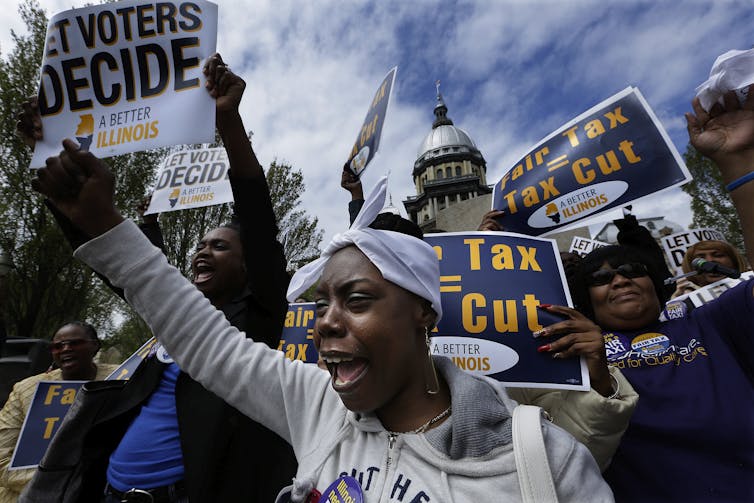
Among the states that do have a personal income tax on wages, the tax rates can either be the same percentage of everyone’s income or they can vary depending on how big the person’s paycheck is. In some states, tax rates increase as a taxpayer makes more money.
No income tax doesn’t mean tax-free
The nine states that don’t have an earned income tax are Alaska, Florida, Nevada, New Hampshire, South Dakota, Tennessee, Texas, Washington and Wyoming. Two of those – New Hampshire and Washington – do tax some income, such as money earned from stocks and other investments, but they don’t tax income earned from working.
When a state doesn’t impose income taxes, it often imposes other taxes to pay for education, roads, health care and other public services.
In some cases, states will impose higher sales taxes or higher property taxes, such as taxes on a person’s home value. Or they may rely on cities and counties to impose those taxes to pay for services. For example, Tennessee has no state income tax, but it has one of the highest combined state and local sales tax rates – 9.548% – of any state.
On the other hand, Alaska is one of the lowest-tax states . It does not have a state income tax or state sales tax. Alaska does, however, have a state property tax, and it is able to impose significant taxes on the oil and gas companies that operate there. Its cities and other local jurisdictions can also impose sales tax at the local level, and they often do.
Pros and cons of no state income tax
There are both benefits and drawbacks to living in states that don’t impose a state income tax.
You might save money. But that doesn’t mean you will pay no taxes, and there are trade-offs to consider. Sometimes, states with no income taxes do not have the best public services.
For example, you may want to move to a state such as Texas to avoid paying income taxes, but you will need to be prepared to pay more for health care. In general, Texas has some of the lowest government spending on health care or public transportation.
When states impose higher property taxes or sales taxes to bring in enough money to make up for the lack of an income tax, that can also affect the overall affordability of living in a no-income-tax state.
This matters the most for lower-income people because state sales taxes have a greater impact on overall affordability. For example, students going to college and working part time may have low incomes. But if they live in a state with a high sales tax instead of an income tax, they will be paying the same high rate as fully employed people with much higher incomes. As a result, the students may struggle more to make ends meet than the full-time worker.
Remember, too, that in most cases, Americans still pay some tax on their income. Even if a person isn’t subject to state income tax, the majority of the U.S. population pays federal income tax, and for many people, those federal taxes are quite a bit higher than any state income tax.
Hello, curious kids! Do you have a question you’d like an expert to answer? Ask an adult to send your question to [email protected] . Please tell us your name, age and the city where you live.
And since curiosity has no age limit – adults, let us know what you’re wondering, too. We won’t be able to answer every question, but we will do our best.
- Constitution
- Curious Kids
- Curious Kids US

Educational Designer

Lecturer, Small Animal Clinical Studies (Primary Care)

Organizational Behaviour – Assistant / Associate Professor (Tenure-Track)

Apply for State Library of Queensland's next round of research opportunities

Associate Professor, Psychology
Where Harris stands on Israel, abortion, climate change, education and the economy
[Editor's note: An earlier version of this story misstated Harris' proposed 2019 climate plan investment levels. The correct estimate is nearly seven times more than Biden's current proposal.]
Vice President Kamala Harris has emerged as the Democratic party’s presidential frontrunner after Joe Biden dropped his reelection bid Sunday.
Most Democrats have backed Harris, who announced her 2024 campaign for president shortly after Biden penned a letter explaining his decision to exit the 2024 race. Depending on who you ask, Harris is viewed as a moderate or a progressive reformer.
A former prosecutor, Harris was elected San Francisco’s district attorney with a “tough on crime” message in 2003 and worked in that role for seven years. She became the state’s attorney general in 2011 and served until 2017, when she was elected to represent California in the U.S. Senate.
Text with USA TODAY: Sign-up now and get answers to all your election questions.
More: Election 2024 live updates: Endorsements rush in for Harris; Trump attacks begin
Harris launched her own unsuccessful presidential campaign at a rally in her hometown of Oakland, California in 2019. She dropped her bid for the White House and joined President Joe Biden’s ticket in August the following year. In 2021, she was sworn in as vice president.
Decades in the public spotlight and on the public record, here is what we know about where Harris stands on key issues:
Foreign Policy
As Biden’s second-in-command, Harris has largely stood behind his foreign policy positions, but there are signs she could be tougher on Israel over the war in Gaza than the president.
Harris has not given reason to believe she will deviate much from Biden on issues relating to China , for example. She is also unlikely to sway from supporting Ukraine. Harris said earlier this year that Russia has committed “crimes against humanity” in Ukraine over the last two years.
Harris has not directly opposed Biden’s staunch support for Israel, but has expressed sympathy for the more than 38,000 Palestinian lives lost during the conflict. She was one of the first high-profile members of his administration to call for an immediate temporary cease-fire in March. She acknowledged the “immense scale of suffering” in Gaza and said the Israel-Hamas war is a “humanitarian catastrophe” for innocent civilians.
Harris’ support for women’s access to abortions has been a focal point of her tenure as the country’s first female vice president. She embarked on a nationwide Reproductive Freedoms Tour earlier this year to draw attention to attacks on abortion access following the Dobbs decision . She attended her first stop in Wisconsin on Jan. 22, the 51st anniversary of Roe v. Wade .
Harris proposed federal protections that would limit state abortion restrictions during her first presidential campaign. Under her proposal, states would need to clear laws regulating abortion with the Department of Justice, which would need to confirm they are constitutional before taking effect, she explained in 2019 .
“How dare these elected leaders believe they are in a better position to tell women what they need, to tell women what is in their best interest?” Harris asked during a visit to a Minnesota Planned Parenthood clinic in March. “We have to be a nation that trusts women.”
Harris has traveled on an Economic Opportunity Tour this summer to defend the Biden administration’s economic policy and attack former President Donald Trump’s economic agenda.
While on tour, she touted legislation passed during Biden’s time in office, including the American Rescue Plan and Inflation Reduction Act . Harris has tried to emphasize that wage increases have outpaced inflation since the pandemic and made the case that Trump has plans to give more tax cuts to the rich.
“Donald Trump gave tax cuts to billionaires,” she said in a June social media post . “President Joe Biden and I are investing in the middle class and making sure billionaires and big corporations pay their fair share.”
The vice president has made clear that climate change is a key issue a Harris administration would seek to address.
While running for president in 2019, she proposed a climate plan with a $10 trillion price tag — nearly seven times more than the $1.6 trillion Biden has invested in addressing the issue. She also called for a ban on fracking.
As a senator, she co-sponsored the Green New Deal , which called for a dramatic increase in the production of renewable fuels, including wind, solar, and hydropower sources. The 10-year mobilization plan pushed for a transition to energy systems less reliant on generating greenhouse gases, which are the primary contributors to climate change.
Harris has been an advocate inside the Biden administration pushing for the president to forgive student loan debt , which became a staple of his domestic policy agenda.
As a senator, she co-sponsored Vermont Sen. Bernie Sanders’ legislation to make two-year college free for all students and waive tuition for middle-class students attending four-year public universities.
At a Pride Month event last year, she criticized Florida’s 2022 “Don’t Say Gay” law banning educators from discussing sexual orientation and gender identity in elementary and middle school classrooms. Shortly after she announced her presidential campaign Sunday, the American Federation of Teachers endorsed Harris.
Rachel Barber is a 2024 election fellow at USA TODAY, focusing on politics and education. Follow her on X, formerly Twitter, at @rachelbarber_
- Log in
- Site search
Teaching personal statement examples
Giving you the chance to show why you'd be a great teacher, your personal statement is an important part of your application and worth taking the time over
What is a teaching personal statement?
Your personal statement is used to explain why you want to become a teacher and your suitability for the role. While your application form briefly outlines your qualifications, skills and work experience, your teaching personal statement is where your personality shines through.
Take your time with it. Many candidates often spend a few weeks on this part of the application as you don't have to write it all at once. You should get someone to read over it and be prepared to receive constructive feedback and write a few drafts before you send it off.
It's important to:
- use examples based on your recent teaching experience
- tailor your personal statement according to the school/age group
- use good, clear, written English, using first person terms such as 'my' and 'I'
- be original and honest
- avoid clichés and general statements, such as 'I've always wanted to teach'
- demonstrate a passion for teaching.
While it's crucial to get it right, your teaching personal statement is only a small part of the application process. Find out how else you'll need to prepare to get a teaching job .
How to write a personal statement for teaching
Your personal statement should be between 500 and 1,000 words. It's crucial that you don't copy and that the statement you provide is your own work .
This is your opportunity to:
- write about any relevant skills and experience you have
- explain your understanding of why teaching is important
- detail why you want to become a teacher
- list any extra skills or experience you have, such as volunteering or first aid.
See personal statements for postgraduate applications for more guidance.
The nature of your personal statement will vary, depending on the type of teaching you'd like to pursue. Take a look at some of our example personal statements to get an idea of how they differ.
Personal statement for PGCE primary
As well as focusing on roles in which you've gained experience with primary-age children, a PGCE primary personal statement should demonstrate your well-rounded personality and any skills that could be useful for the range of extra-curricular activities primary schools provide (such as the ability to read music for recorder lessons, or drama experience to help with school plays).
Personal statement for PGCE secondary
Many good PGCE secondary personal statements acknowledge the challenges involved in teaching older pupils and provide examples of where the candidate has worked to overcome these problems. As secondary teaching roles are geared towards teaching a specific subject, training providers are looking for more evidence of your subject and degree knowledge.
Personal statement for School Direct
If you're applying for the salaried School Direct route, you should discuss the experience you've gained in the classroom prior to your application. One of your references will need to be from an employer, or someone who can comment on your work ethic and suitability for teaching. Don't worry if your degree is unrelated to the subject you'd like to teach - you may still be able to apply by completing a subject knowledge enhancement (SKE) course .
Find out more
- Discover how to structure a teaching CV .
- Find out what it's really like to be a primary or secondary school teacher .
- Search postgraduate courses in teaching .
How would you rate this page?
On a scale where 1 is dislike and 5 is like
- Dislike 1 unhappy-very
- Like 5 happy-very
Thank you for rating the page
- Election 2024
- Entertainment
- Newsletters
- Photography
- AP Buyline Personal Finance
- AP Buyline Shopping
- Press Releases
- Israel-Hamas War
- Russia-Ukraine War
- Global elections
- Asia Pacific
- Latin America
- Middle East
- Election Results
- Delegate Tracker
- AP & Elections
- 2024 Paris Olympic Games
- Auto Racing
- Movie reviews
- Book reviews
- Financial Markets
- Business Highlights
- Financial wellness
- Artificial Intelligence
- Social Media
Transcript: Biden’s speech explaining why he withdrew from the 2024 presidential race
President Joe Biden addresses the nation from the Oval Office of the White House in Washington, Wednesday, July 24, 2024, about his decision to drop his Democratic reelection bid. (AP Photo/Evan Vucci, Pool)
- Copy Link copied
WASHINGTON (AP) — Transcript of President Joe Biden’s address to the nation on July 24, 2024:
My fellow Americans, I’m speaking to you tonight from behind the Resolute Desk in the Oval Office. In this sacred space, I’m surrounded by portraits of extraordinary American presidents. Thomas Jefferson wrote the immortal words that guide this nation. George Washington, who showed us presidents are not kings. Abraham Lincoln, who implored us to reject malice. Franklin Roosevelt, who inspired us to reject fear.
I revere this office, but I love my country more.
It’s been the honor of my life to serve as your president. But in the defense of democracy, which is at stake, I think it’s more important than any title.
I draw strength and I find joy in working for the American people, but this sacred task of perfecting our union is not about me. It’s about you, your families, your futures. It’s about we the people, and we can never forget that. And I never have.
I’ve made it clear that I believe America is at an inflection point, one of those rare moments in history when the decisions we make now will determine our fate of our nation and the world for decades to come.
America is going to have to choose between moving forward or backward, between hope and hate, between unity and division. We have to decide, do we still believe in honesty, decency, respect, freedom, justice and democracy? In this moment, we can see those we disagree with not as enemies, but as fellow Americans. Can we do that? Does character in public life still matter?
I believe you know the answer to these questions because I know you, the American people, and I know this, we are a great nation because we are a good people.
When you elected me to this office, I promised to always level with you, to tell you the truth. And the truth, the sacred cause of this country, is larger than any one of us, and those of us who cherish that cause cherish it so much, a cause of American democracy itself must unite to protect it.
You know, in recent weeks it’s become clear to me that I needed to unite my party in this critical endeavor. I believe my record as president, my leadership in the world, my vision for America’s future all merited a second term, but nothing, nothing can come in the way of saving our democracy, and that includes personal ambition.
So I’ve decided the best way forward is to pass the torch to a new generation. That’s the best way to unite our nation. I know there is a time and a place for long years of experience in public life, but there’s also a time and a place for new voices, fresh voices, yes, younger voices, and that time and place is now.
What to know about the 2024 Election
- Democracy: American democracy has overcome big stress tests since 2020. More challenges lie ahead in 2024.
- AP’s Role: The Associated Press is the most trusted source of information on election night, with a history of accuracy dating to 1848. Learn more.
- Stay informed. Keep your pulse on the news with breaking news email alerts. Sign up here .
Over the next six months, I’ll be focused on doing my job as president. That means I’ll continue to lower costs for hard-working families, grow our economy. I’ll keep defending our personal freedoms and our civil rights, from the right to vote to the right to choose. I’ll keep calling out hate and extremism, make it clear there is no place, no place in America for political violence or any violence ever, period. I’m going to keep speaking out to protect our kids from gun violence, our planet from climate crisis, is the existential threat.
And I will keep fighting for my for my cancer moonshot, so we can end cancer as we know it because we can do it. And I’m going to call for Supreme Court reform because this is critical to our democracy, Supreme Court reform. You know, I will keep working to ensure America remains strong and secure and the leader of the free world.
I’m the first president in this century to report to the American people that the United States is not at war anywhere in the world. We’ll keep rallying a coalition of proud nations to stop Putin from taking over Ukraine and doing more damage. We’ll keep NATO stronger, and I’ll make it more powerful and more united than at any time in all of our history. I’ll keep doing the same for allies in the Pacific.
You know, when I came to office, the conventional wisdom was that China would inevitably surpass the United States. That’s not the case anymore. And I’m going to keep working to end the war in Gaza, bring home all the hostages and bring peace and security to the Middle East and end this war.
We’re also working around the clock to bring home Americans being unjustly detained all around the world. You know, we’ve come so far since my inauguration. On that day, I told you as I stood in that winter — we stood in a winter of peril and a winter of possibilities, peril and possibilities. We were in the grip of the worst pandemic in the century, the worst economic crisis since the Great Depression, the worst attack on our democracy since the Civil War, but we came together as Americans, and we got through it. We emerged stronger, more prosperous and more secure.
Today, we have the strongest economy in the world, creating nearly 16 million new jobs — a record. Wages are up, inflation continues to come down, the racial wealth gap is the lowest it’s been in 20 years. We’re literally rebuilding our entire nation, urban, suburban, rural and tribal communities. Manufacturing has come back to America.
We’re leading the world again in chips and science and innovation. We finally beat Big Pharma after all these years, to lower the cost of prescription drugs for seniors, and I’m going to keep fighting to make sure we lower the cost for everyone, not just seniors.
More people have health care today in America than ever before. And I signed one of the most significant laws helping millions of veterans and their families who were exposed to toxic materials. You know, the most significant climate law ever, ever in the history of the world, the first major gun safety law in 30 years. And today, violent crime rate is at a 50-year low.
We’re also securing our border. Border crossings are lower today than when the previous administration left office. And I’ve kept my commitment to appoint the first Black woman to the Supreme Court of the United States of America. I also kept my commitment to have an administration that looks like America and be a president for all Americans.
That’s what I’ve done. I ran for president four years ago because I believed, and still do, that the soul of America was at stake. The very nature of who we are was at stake and that’s still the case. America is an idea, an idea stronger than any army, bigger than any ocean, more powerful than any dictator or tyrant.
It’s the most powerful idea in the history of the world. That idea is that we hold these truths to be self-evident. We’re all created equal, endowed by our creator with certain inalienable rights, life, liberty, pursuit of happiness. We’ve never fully lived up to it, to this sacred idea, but we’ve never walked away from it either and I do not believe the American people will walk away from it now.
In just a few months, the American people will choose the course of America’s future. I made my choice. I made my views known. I would like to thank our great Vice President Kamala Harris. She’s experienced, she’s tough, she’s capable. She’s been an incredible partner to me and a leader for our country. Now the choice is up to you, the American people.
When you make that choice, remember the words of Benjamin Franklin. It’s hanging on my wall here in the Oval Office, alongside the bust of Dr. King and Rosa Parks and Cesar Chavez. When Ben Franklin was asked as he emerged from the convention going on, whether the founders have given America a monarchy or republic, Franklin’s response was “a republic, if you can keep it.” A republic if you can keep it. Whether we keep our republic is now in your hands.
My fellow Americans, it’s been the privilege of my life to serve this nation for over 50 years. Nowhere else on earth could a kid with a stutter from modest beginnings in Scranton, Pennsylvania, and Claymont, Delaware, one day sit behind the Resolute Desk in the Oval Office as President of the United States, but here I am. That’s what’s so special about America.
We are a nation of promise and possibilities, of dreamers and doers, of ordinary Americans doing extraordinary things. I’ve given my heart and my soul to our nation, like so many others. I’ve been blessed a million times in return with the love and support of the American people. I hope you have some idea how grateful I am to all of you.
The great thing about America is here kings and dictators do not rule, the people do. History is in your hands. The power is in your hands. The idea of America lies in your hands. We just have to keep faith, keep the faith and remember who we are. We’re the United States of America and there’s simply nothing, nothing beyond our capacity when we do it together.
So let’s act together, preserve our democracy. God bless you all and may God protect our troops. Thank you.
Read Biden's letter to the nation stepping aside
President Joe Biden announced Sunday in a letter to the nation posted on X that he had decided not to seek re-election , a move that followed mounting pressure from the Democratic Party for him to end his re-election bid after his disastrous debate performance last month.
- Accessibility Options:
- Skip to Content
- Skip to Search
- Skip to footer
- Office of Disability Services
- Request Assistance
- 305-284-2374
- High Contrast
- School of Architecture
- College of Arts and Sciences
- Miami Herbert Business School
- School of Communication
- School of Education and Human Development
- College of Engineering
- School of Law
- Rosenstiel School of Marine, Atmospheric, and Earth Science
- Miller School of Medicine
- Frost School of Music
- School of Nursing and Health Studies
- The Graduate School
- Division of Continuing and International Education
- People Search
- Class Search
- IT Help and Support
- Privacy Statement
- Student Life
- University of Miami
- Division of University Communications
- Office of Media Relations
- Miller School of Medicine Communications
- Hurricane Sports
- UM Media Experts
- Emergency Preparedness
- Awards & Honors
- Career Development
- Press Releases
- Student Scholarships
- Student Spotlight
- More Headlines
- Admissions Events
- Alumni Events
- Continuing Legal Education
- Publications
- Prospective Students
- Faculty & Academics
- Alumni & Giving
- Latest Headlines
- Subscribe to News@TheU Newsletter
- UM NEWS HOME
Tips for Writing Your Master of Legal Studies Personal Statement

By Miami Law Blog Contributor 07-25-2024
Applying to a Master of Legal Studies (M.L.S.) program is an excellent first step in advancing your legal knowledge in your respective field. Each M.L.S. program sets its own requirements for application and admittance—yet for any graduate-level program, it is common for a personal statement to be required as part of any application.
Read on for practical tips to integrate into your statement, along with common mistakes to avoid.
Understanding the Importance of Your Personal Statement
A personal statement refers to an essay that is typically required as part of a college or graduate program application (most often for advanced degree programs).
The Role of the Personal Statement in Your Application
Personal statements give applicants a unique opportunity to share additional information about themselves that may not already be reflected in their academic transcripts, resumes, or other application materials. In advanced degree programs where spots may be limited, a personal statement could make or break an application.
Preparing to Write Your M.L.S. Personal Statement
As you prepare to write your personal statement, there are a few steps that can make the writing process as easy as possible.
Gathering Necessary Information and Resources
Start by collecting any specific information, resources, or documents you may need to write your M.L.S. personal statement accurately. This is especially essential if you plan on referring to your academic transcripts, awards received, or other formal documents in your text.
Identifying Your Unique Qualities and Experiences
Compelling personal statements tend to be ones that communicate an applicant's distinct experiences and qualities. With this in mind, it is useful to set aside time for self-reflection before you start writing. Specifically, consider the personality traits you have that might make you a good fit for the program. In addition, think about any examples of life experiences that you may want to incorporate into your essay.
Tips for a Successful Personal Statement for Legal Studies
As you begin crafting your Master of Legal Studies personal statement, keep in mind some best practices to help your essay stand out from the dozens (or hundreds) of essays your admissions committee will be reading.
Start With an Outline
When writing any kind of important document, it is wise to start with a detailed outline that includes your thesis, your main points, and any supporting evidence (such as real-world examples or stories). Once you have a solid outline, you may find it considerably easier to start writing.
Be Authentic and Honest
One of the most crucial characteristics of any successful personal statement is authenticity. While there iss nothing wrong with highlighting your strengths and even bragging a bit, you want to avoid dishonesty or anything that might come off as less than genuine.
Highlight Your Interest in Legal Studies
One of the main reasons many M.L.S. programs require a personal statement is because in the first place, the admissions committee wants to truly get to know applicants and what interests them in a legal studies program. Therefore, it is critical to clearly communicate why you want to pursue an M.L.S. degree, whether it is to expand your knowledge in a specific area or advance your career.
Demonstrate Critical Thinking and Analytical Skills
Completing an M.L.S. program requires a great deal of critical thinking, analytical, and problem-solving skills. You can demonstrate how you possess these skills in your personal statement by sharing specific stories or examples of situations where you have been required to think outside of the box or make an important, calculated decision.
Avoid Common Pitfalls and Cliches
There are certain phrases and tropes that M.L.S. admissions committees have probably seen in personal statements hundreds of times already, so it is ideal to avoid these in your writing. Try to ensure every sentence is truly unique and not something you would find in other essays—or that could be easily upstaged by other applicants. A few examples of content and cliches to avoid could include:
- Discussing legal topics or issues that might be controversial.
- Focusing too much on the external world or other people instead of your own goals and experiences.
- Starting with a quote, statistic, abstract question, or anything else that directs the attention away from you .
- Leaning too heavily into sharing personal hardships (particularly cliches like a sports injury) to prove how you have overcome struggles.
- Pulling from scenarios in the distant past (such as how you learned to be a team player in high school extracurriculars or opening with, “My passion for legal matters began at a young age…”)
Showcase Your Unique Experience
Everybody has something different to bring to the table, but your admissions committee will not understand the scope of your personal experience unless you address it in your personal statement. If you have relevant work experience, a background in legal education, or something else that sets you apart, be sure to weave it into your M.L.S. personal statement.
Emphasize Your Motivation for Pursuing a Master of Legal Studies
People have various motivations for obtaining an M.L.S. degree. Your personal statement is your chance to highlight your own reasons for wanting to pursue this degree. Remember that your reasoning should not be all about you , so it can be useful to consider how earning your M.L.S. might help others or even contribute to the field as a whole.
Highlight Your Academic Achievements
Even if your academic achievements are already covered in an academic transcript, resume, or other application materials, your M.L.S. personal statement can be an opportunity to succinctly call out anything noteworthy or particularly relevant that might not be immediately apparent in those documents. Ideally, you can connect these achievements to a personal story or anecdote in your essay.
Incorporate Your Future Goals
Take time to reflect on your short- and long-term goals as well as how obtaining an M.L.S. degree may help you pursue those goals. This is something you'll also want to cover in your personal statement, most likely toward the end of the document.
Be Open to Feedback from Peers
One of the best things you can do when creating your personal statement is to get feedback from peers. After you have finished your first draft, do not hesitate to ask family members, mentors, or trusted friends to read through your essay and make comments. This can be an excellent way to gain and incorporate valuable feedback that could strengthen your essay even more.
Take the Time to Proofread
Even with built-in spell checkers in most word processing software today, it is still crucial to actually read through your essay and do your own proofreading before submitting your personal statement. A helpful rule of thumb is to read through the document twice: The first time, read it out loud to check for flow and grammatical errors. The second time, read it backwards to better spot typos and misspellings.
Common Mistakes to Avoid
As you work on your personal statement for your M.L.S., you’ll also want to make note of some errors to avoid.
Being Too Vague or Generic
In many cases, your personal statement is your one opportunity to really make your application stand out—so make sure to avoid language that is overly vague or generic. Instead, refer to specific life experiences and the unique qualities you would carry into a graduate-level program.
Overloading on Legal Jargon
As tempting as it may be to flaunt your knowledge of legal jargon in your Master of Legal Studies personal statement, remember that the admissions committee members reading your essay might not be in the legal field. With this in mind, it is best to stick with simple language regarding the law. There is nothing wrong with incorporating a few common legal terms here and there, but this is not the time to overdo it with the terminology.
Ignoring the Prompt or Instructions
One of the biggest mistakes applicants make when crafting a personal statement is ignoring the prompt and going in their own direction. Oftentimes, writing prompts will include specific questions to answer or topics to address. Failing to closely adhere to the prompt may demonstrate to your admissions committee that you are not detail-oriented or do not follow directions carefully.
How Long Should My Personal Statement Be?
Generally speaking, most personal statements should be at least a page or 500 words long, but this will all depend on your program's specific guidelines regarding word counts, page limits, spacing, and font sizes.
How Do I Start My Personal Statement?
The best way to start a personal statement is with a "hook," or something that will capture your readers' attention and interest. Many applicants find success beginning their essays with a personal anecdote, a question, or even a surprising fact.
What Topics Should I Avoid in My Personal Statement?
Try to steer clear of any taboo topics that might stir up controversy (e.g., politics and religion), as you never know who might be reading your essay. Additionally, avoid discussing personal struggles that lack a clear, relevant resolution or lesson. Lastly, do not include information that is redundant with skills, accomplishments, or credentials already clearly listed on your resume or transcripts; put a spin on it so you are sharing a personal story, insight, or competency that the reader could not glean from your application elsewhere.
How Can I Make My Personal Statement Stand Out?
There are plenty of ways to set your personal statement apart from other essays, such as incorporating personal anecdotes and experiences while tying them back to your motivation for applying. The more creative yet authentic you remain, the more memorable and compelling your essay will be to the admissions committee reading it.
Ready to Apply for a Master of Legal Studies Program?
Ultimately, writing an M.L.S. personal statement is all about reflecting upon why you are interested in the program and what might set you apart from other applicants. By following the above tips and best practices, you will be in better shape when it comes time to write your personal statement for legal studies.
Are you seeking the right online Master of Legal Studies degree program for you? Learn more about the University of Miami School of Law's online M.L.S. curriculum with tracks in human resources, cybersecurity, finance, and more—then get started with your online application today.
https://admissions.law.miami.edu/academics/mls/
https://admissions.law.miami.edu/academics/mls/curriculum/
https://lifehacker.com/think-backwards-when-proofreading-your-writing-for-spel-1793189994
Campus Visit Reservation Form
Learn about us, j.d., ll.m., and s.j.d., get started.

University of Miami School of Law
- 1311 Miller Drive Coral Gables , FL 33146
- [email protected]
- Current Students
- Careers - OCPD
Quick Links
- Academic Calendar - Law School
- Academic Calendar - University
- Events Calendar
Communications
- For the Media
- Web Feedback
- ABA Required Disclosures
- Policies & Privacy Statements
- Visiting the Law School
- Parking & Transportation
- social-facebook
- social-twitter
- social-youtube
- social-instagram
- social-linkedin
- social-threads
Copyright: 2024 University of Miami. All Rights Reserved. Emergency Information Privacy Statement & Legal Notices Title IX & Gender Equity Website Feedback
Individuals with disabilities who experience any technology-based barriers accessing the University’s websites or services can visit the Office of Workplace Equity and Inclusion .
A .gov website belongs to an official government organization in the United States.
A lock ( ) or https:// means you've safely connected to the .gov website. Share sensitive information only on official, secure websites.
- About COVID-19
- People with Certain Medical Conditions and COVID-19
- COVID-19 Vaccines
- How to Protect Yourself and Others
- Tools and Resources
- Clinical Care
- Infection Control Guidance
- Clinical Care Quick Reference
- Overview of Testing for SARS-CoV-2
- Surveillance and Data Analytics
- Safety Precautions: Cleaning and Disinfecting for COVID-19
- Interim Guidelines for Biosafety and COVID-19
- CDC Science behind Long COVID
- Health Equity in COVID-19
- Variants and Genomic Surveillance for SARS-CoV-2
- View All Home
What to know
- CDC’s Respiratory Virus Guidance provides strategies you can use to help protect yourself and others from health risks caused by COVID-19 and other respiratory viruses.
- These actions can help you lower the risk of COVID-19 transmission (spreading or catching COVID-19) and lower the risk of severe illness if you get sick.

Core Prevention Strategies
CDC recommends that all people use core prevention strategies to protect themselves and others from COVID-19:
- Although vaccinated people sometimes get infected with the virus that causes COVID-19, staying up to date on COVID-19 vaccines significantly lowers the risk of getting very sick, being hospitalized, or dying from COVID-19.
- Practice good hygiene (practices that improve cleanliness)
- Take steps for cleaner air
When you are sick:
- Learn when you can go back to your normal activities .
- Seek health care promptly for testing and/or treatment if you have risk factors for severe illness . Treatment may help lower your risk of severe illness, but it needs to be started within a few days of when your symptoms begin.
Additional Prevention Strategies
In addition, there are other prevention strategies that you can choose to further protect yourself and others.
- Wearing a mask and putting distance between yourself and others can help lower the risk of COVID-19 transmission.
- Testing for COVID-19 can help you decide what to do next, like getting treatment to reduce your risk of severe illness and taking steps to lower your chances of spreading COVID-19 to others.
What to watch out for
Using these prevention strategies can be especially helpful when:
- Respiratory viruses, such as COVID-19, flu, and RSV, are causing a lot of illness in your community
- You or those around you have risk factors for severe illness
- You or those around you were recently exposed to a respiratory virus, are sick, or are recovering
Check Your Community
COVID-19 (coronavirus disease 2019) is a disease caused by a virus named SARS-CoV-2. It can be very contagious and spreads quickly.
For Everyone
Health care providers, public health.

IMAGES
VIDEO
COMMENTS
A PGCE personal statement is written as part of the application process for teacher training and gives candidates an opportunity to showcase their skills and attributes.. PGCE candidates will only write one personal statement, which is used to apply for all of their preferred choices. Students upload their personal statement to the UCAS Teacher Training system, and it is submitted for all ...
Your personal statement should be: no more than 1000 words. written in the first-person. grammatically correct - we suggest writing in a document before adding to your application. your own work, don't copy from anywhere online. structured correctly with a clear introduction, evidenced paragraphs and a conclusion.
Your structure can look something like: Introduction - about yourself and why you want to do the PGCE. Middle paragraphs - relevant information of your academic achievements and experiences of working within education. Concluding paragraph - tying up the main points of why you're the best candidate for the course.
Just start by showing your enthusiasm for the subject, showcasing your knowledge and understanding, and sharing your ambitions of what you want to achieve. Avoid cliches . Remember, this opening part is simply about introducing yourself, so let the admissions tutor reading your personal statement get to know you. Keep it relevant and simple.
Clare talks to us about how to write a successful PGCE personal statement. The video will cover the process on applying, show two statement examples and prov...
Example personal statement for PGCE secondary. I became interested in teaching after realising how much I had benefited from excellent and passionate teachers. They exuded a real sense of enthusiasm for learning, which inspires me to pass on that passion. My love for computing developed during my A-levels after discovering an aptitude for ...
PGCE Personal Statement Sample. Learning is natural, necessary and nurtured aspect of life. Being a teacher will allow me to become an important figure in this process, where I endeavour to impart knowledge, expand perceptions and provide life tools during a critical stage in development. Work experience, interpersonal skills and a solid ...
Your Personal Statement should: be persuasive. be fluent, realistic, relevant and specific. mention young people- it is about enabling them to learn rather than why you want to teach. be honest. Avoid: overuse of short sentences all beginning with 'I'. general statements and narrative.
UK Earnings Potential For PGCEs. The average earnings for someone with a PGCE will depend on the type of job they are able to secure. Generally, those with a PGCE can expect to earn between £25,000 and £45,000 per year, depending on their experience and the job they are able to secure.
A Masters personal statement is a piece of writing that you submit as part of your postgraduate application. It's your first real chance to sell yourself to the university and to demonstrate to admissions tutors that you're right for the course. It's likely that you've already written a personal statement for your Bachelors degree, so this ...
Here are some key skills to mention when writing your PGCE personal statement: Management skills. Organisational skills. Teamwork skills. Training and coaching experience. Direct contact and engagement with children. Communication with a range of audiences. IT and computer literacy.
A personal statement is a short piece of writing (47 lines/4000 characters) which you are asked to submit in support of your application to study a PGDE/CE made through UCAS. It is your opportunity to demonstrate your skills, experience and motivation for teaching. Before you start. Remember that this is a very important part of your application.
This PGCE personal statement examples resource is perfect to help anyone when it comes to writing their statements. This document has a wealth of information that will guide you through a process that can be difficult at times. It includes: Knowledge and interest in the subject area. Suitability for the course.
Primary Teacher Personal Statement Example. One day, I hope to become a primary teacher. Primary and secondary education have both been highly positive experiences for me. It is my desire to inspire and encourage children of all abilities to achieve their full potential that drives me to apply for primary education.
PGCE Personal Statement Writing Services. Our company is the UK's leader when it comes to writing and editing bespoke UCAS personal statements for undergraduate and postgraduate courses. Our staff are exceptional writers and education experts, with decades of combined experience in writing unique professional statements on behalf of ...
Example personal statement for PGCE primary. In my early education, reading and writing were a challenge. At age nine I received a diagnosis of dyslexia bringing with it extra support from the school. This gave me a real determination to overcome my disability. It drove me to study hard, achieve high GCSE and A-level grades and go on to achieve ...
Writing a personal statement for teacher training. These guidelines apply to applications for a PGCE or Schools Direct which are both made through Apply on the .Gov website. Include the following: Your reasons for teaching: Avoid clichés like, "I've always wanted to be a teacher". Choice of programme: Demonstrate that you have made a well ...
Teacher Training Personal Statement Example (Primary PGCE) 1. I have chosen to apply for a primary teaching degree because I enjoy working with children. I have a strong interest in teaching and the learning process of children. This is been confirmed by my work experience report...
Give appropriate evidence of the skills you possess for teaching. Indicate the relevance of any other types of experience or skills you possess, e.g. working with people, sports or languages etc. Avoid using negative language. Present any gaps in skills or experience positively. Check grammar and spelling thoroughly!
#PersonalStatement #Teaching #TeacherTraining #PGCE #PGCEPrimaryHello!I'm a first class Masters graduate and a Teaching Assistant applying for a PGCE in Prim...
Here are some key skills to mention when writing your PGCE personal statement: Management skills. Organisational skills. Teamwork skills. Training and coaching experience. Direct contact and engagement with children. Communication with a range of audiences. IT and computer literacy.
Requirements of Personal statement for Adult Education PGCE: In this type of PGCE personal statement, you should incorporate all of the said details that make you an ideal candidate for the course. However, make sure to convey this information in a modest way without including statements such as. "I am the best.".
Disclosure statement. ... Among the states that do have a personal income tax on wages, ... Write an article and join a growing community of more than 187,500 academics and researchers from 5,003 ...
Harris proposed federal protections that would limit state abortion restrictions during her first presidential campaign. Under her proposal, states would need to clear laws regulating abortion ...
How to write a personal statement for teaching. Your personal statement should be between 500 and 1,000 words. It's crucial that you ... Personal statement for PGCE primary. As well as focusing on roles in which you've gained experience with primary-age children, a PGCE primary personal statement should demonstrate your well-rounded personality ...
You know, in recent weeks it's become clear to me that I needed to unite my party in this critical endeavor. I believe my record as president, my leadership in the world, my vision for America's future all merited a second term, but nothing, nothing can come in the way of saving our democracy, and that includes personal ambition.
President Joe Biden announced Sunday that he had decided not to seek re-election, a move that followed mounting pressure from the Democratic Party for him to end his re-election bid after his ...
Ultimately, writing an M.L.S. personal statement is all about reflecting upon why you are interested in the program and what might set you apart from other applicants. By following the above tips and best practices, you will be in better shape when it comes time to write your personal statement for legal studies.
Core Prevention Strategies. CDC recommends that all people use core prevention strategies to protect themselves and others from COVID-19:. Stay up to date with COVID-19 vaccines.. Although vaccinated people sometimes get infected with the virus that causes COVID-19, staying up to date on COVID-19 vaccines significantly lowers the risk of getting very sick, being hospitalized, or dying from ...
Second, we are working towards creating increasingly aligned and steerable models. Our shift from models like the first version of GPT-3 to InstructGPT and ChatGPT (opens in a new window) is an early example of this. In particular, we think it's important that society agree on extremely wide bounds of how AI can be used, but that within those bounds, individual users have a lot of discretion.